The best WordPress Cache Plugins
On this page, I show you the best WordPress caching plugins in my opinion. Here I present all solutions in more detail and tell you what advantages and disadvantages they have to offer you.
A WordPress caching plugin caches dynamic WordPress data so that it can be accessed faster by visitors. The cache contains static files for the entire blog, which are delivered immediately and without slow database queries as HTML files. The cache is mandatory.
The best caching plugin
Without caching, WordPress cannot be run effectively. That’s why I took a closer look at the most popular and best WordPress caching plugins for you. Exactly those I present to you here now.
1. WP Rocket
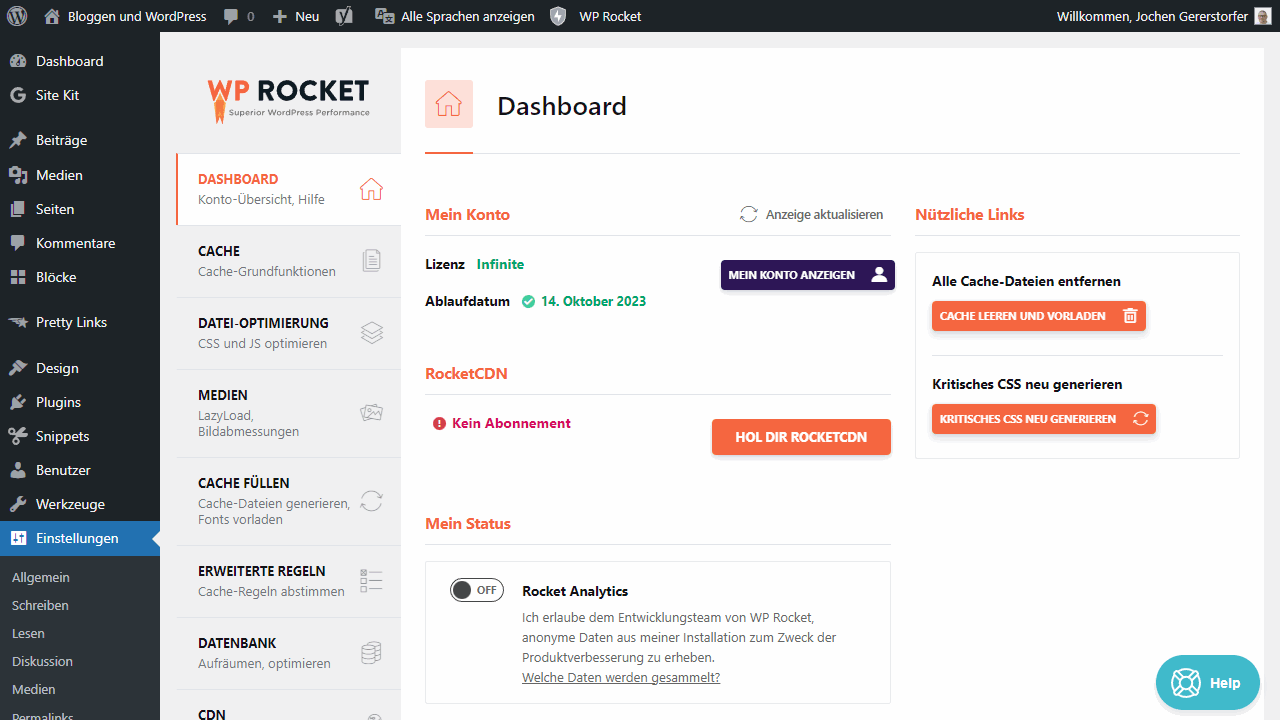
WP Rocket is one of those WordPress plugins that has been constantly improving since its release. When it was released, it wasn’t that common for caching plugins to cost money. WP Rocket, however, quickly made it clear that it was worth the money. This was due to the enormous functionality of the caching plugin and also because there were constantly useful extensions and updates. Over the years, WP Rocket became a real all-rounder in the field of WordPress caching and implemented every modern performance optimization and caching method in a timely manner.
WP Rocket’s features include classic WordPress blog page caching, GZIP compression and browser caching. Special features include cache preloading, where the first page load is automatic, so the page is cached from the first moment. WP Rocket has also evolved into a performance plugin apart from caching. There is now lazy load, JS and CSS optimization, and many other features that can massively improve the performance of your WordPress website.
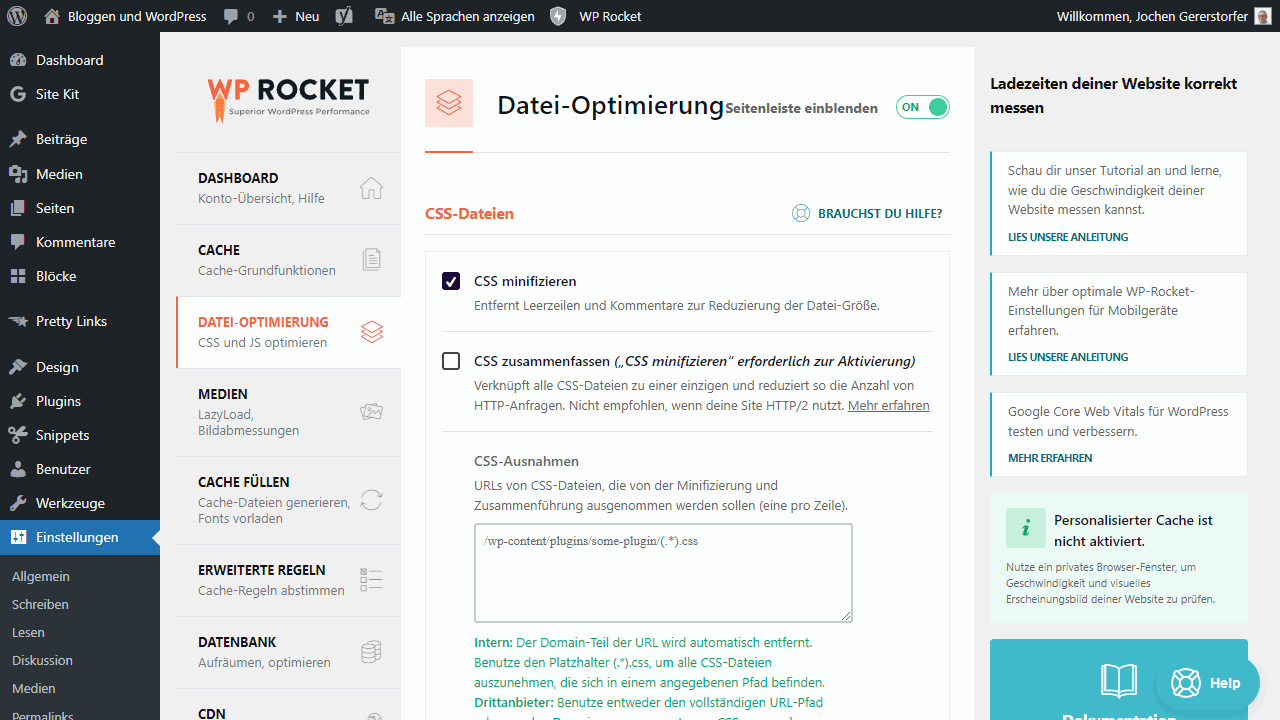
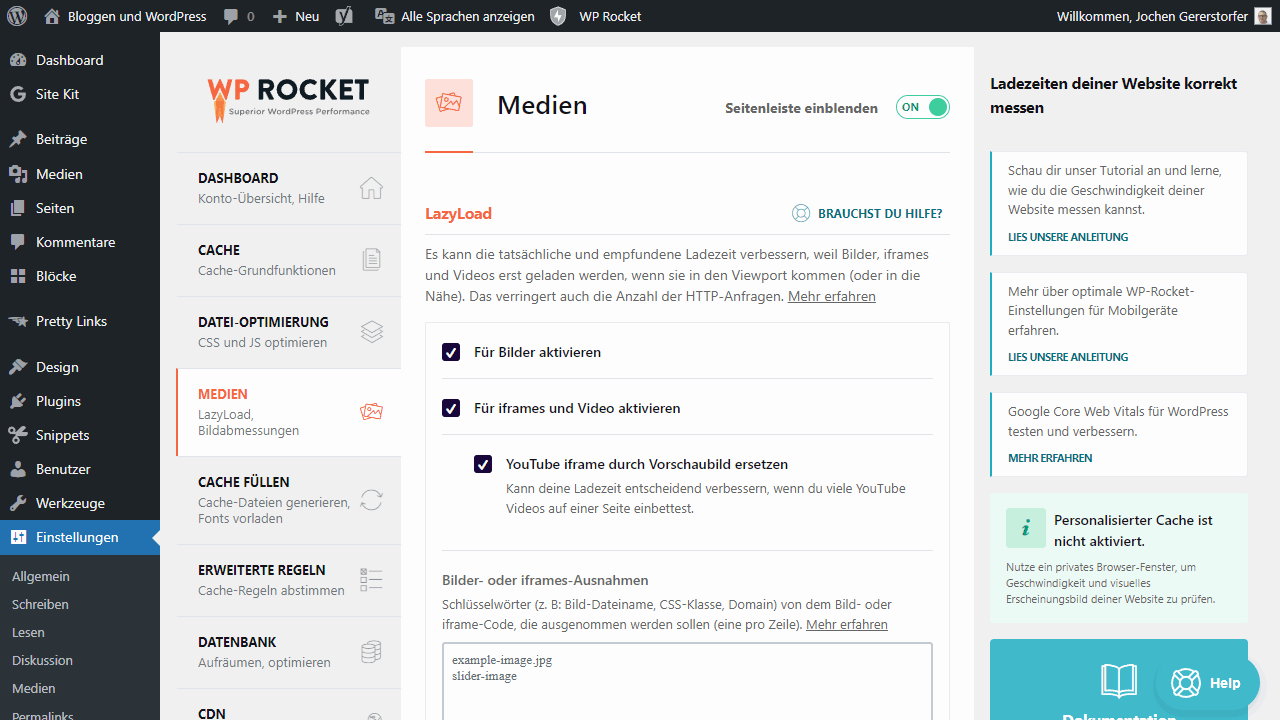
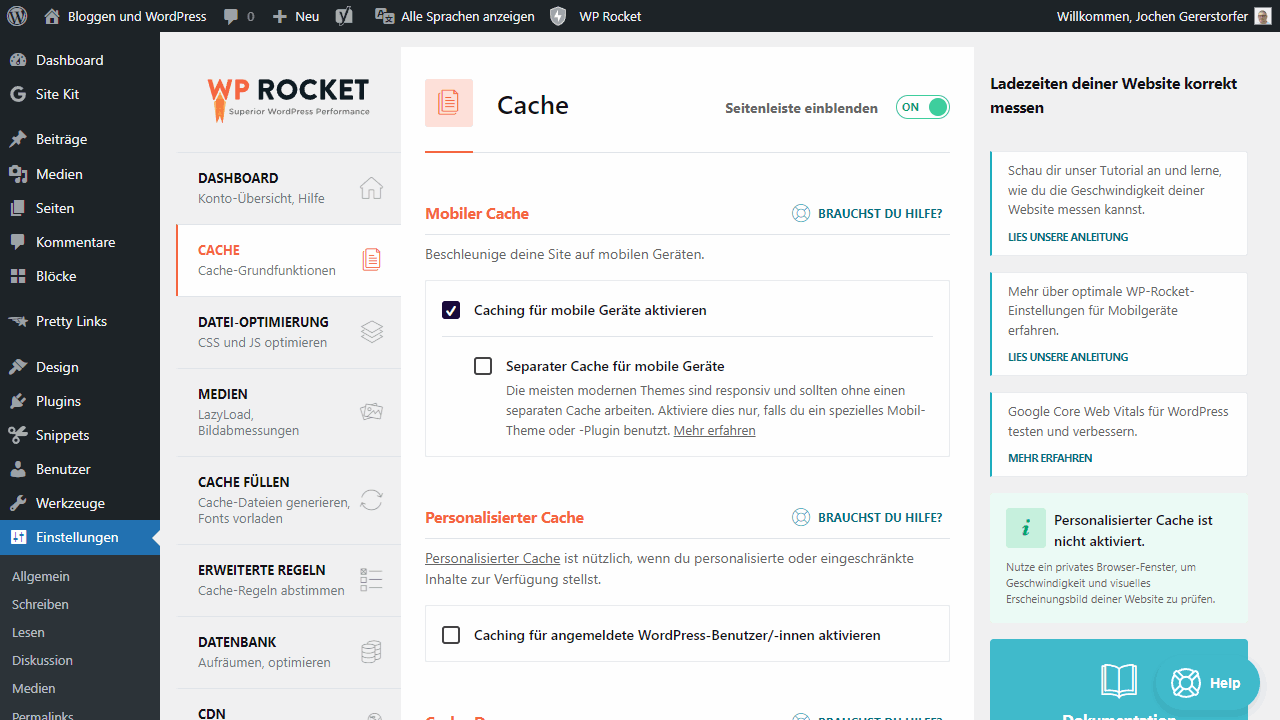
WP Rocket – the complete guide.
Advantages
- One of the simplest and most effective caching plugins
- Connection to the RocketCDN and Imagify from the same developer
- Extremely good support and high compatibility within WordPress
- Fair pricing for what it offers and support
Cons
- None known, even the price is good
2. Swift Performance
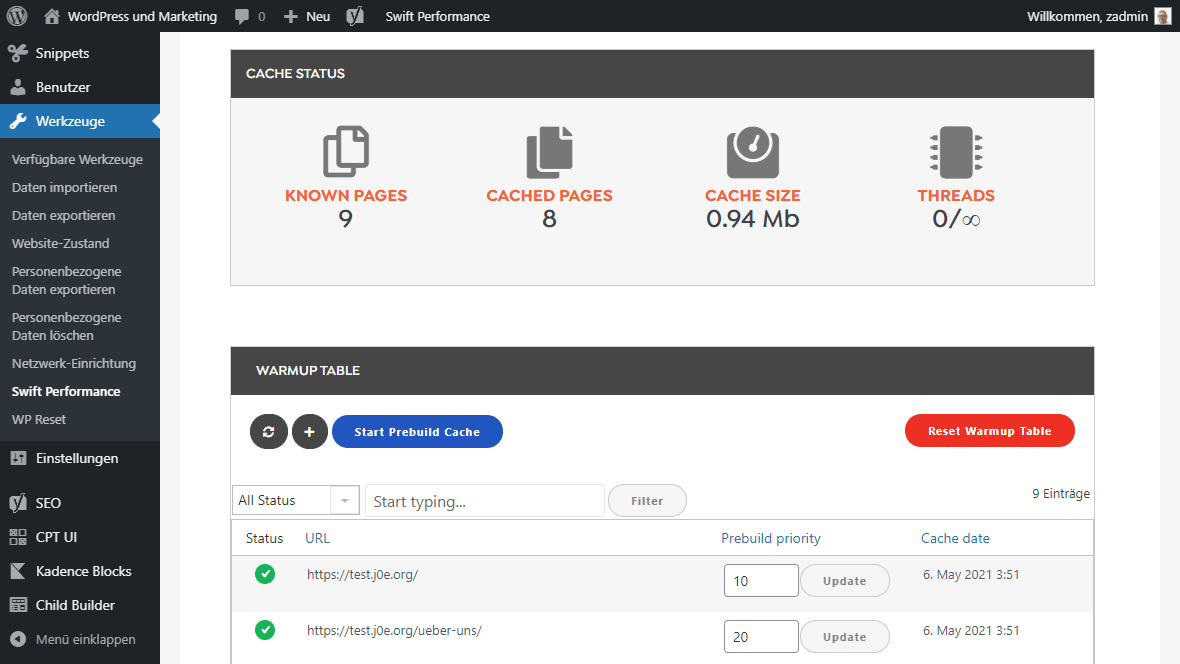
Swift Performance is something like an all-in-one plugin for WordPress performance. The extension not only takes care of an effective page cache, but also of all kinds of performance tweaks for the CMS itself. The caching system forms the solid basis on which the entire plugin is built. Swift Performance focuses on a simple setup and guides you through the different menus with a multitude of explanations and hints. Everything is explained so well that even beginners should have no problem getting more out of their blog.
Besides the very efficient WordPress caching, Swift Performance minimizes Javascript and CSS files. If desired, it also optimizes the MySQL database and can also compress images directly during upload within WordPress and thus massively reduce their size. Really clever is the integrated Plugin Organizer, which disables extensions on certain subpages of WordPress. Also, the Heartbeat API can be regulated and there are plenty of other performance tweaks for WordPress. Swift Performance ends up being much more than just a caching plugin. Rather, it takes care of all relevant aspects for better WordPress performance and allows you to access even complicated tweaks with simple options in the menu.
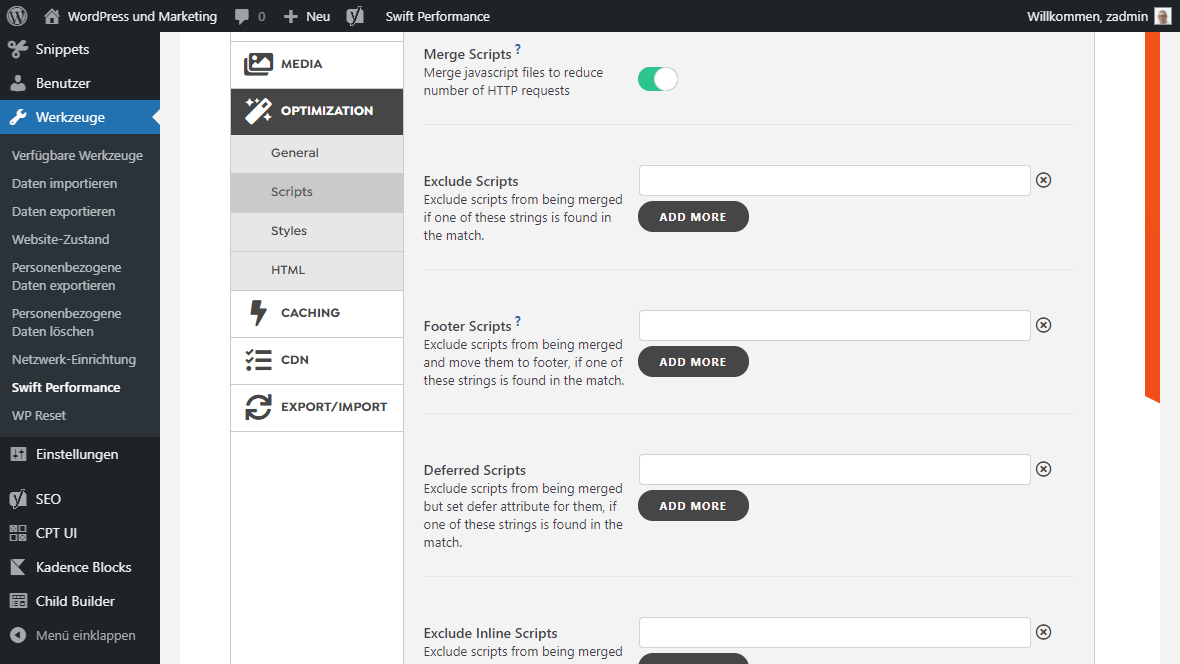
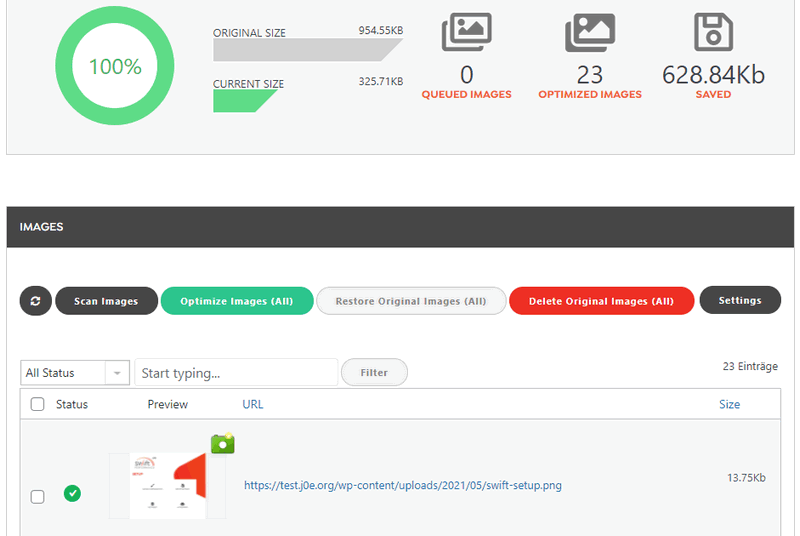
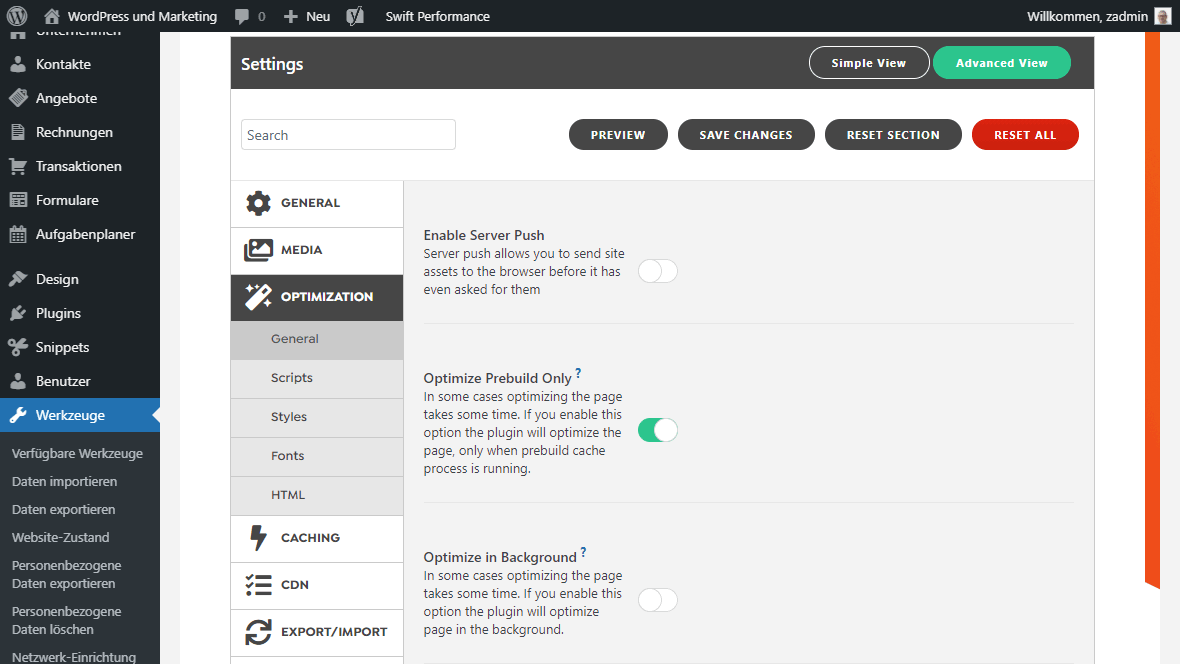
My Swift performance guide and setup guide.
Advantages
- Strong caching system as the basis of the plugin
- Many functions, all explained in an understandable way
- Image optimizer is already included (with other plugins often only available separately)
- Many clever tweaks for WordPress itself, which can be easily activated and deactivated here via menus
Disadvantages
- Functionality may be a little too much for beginners
3. FlyingPress
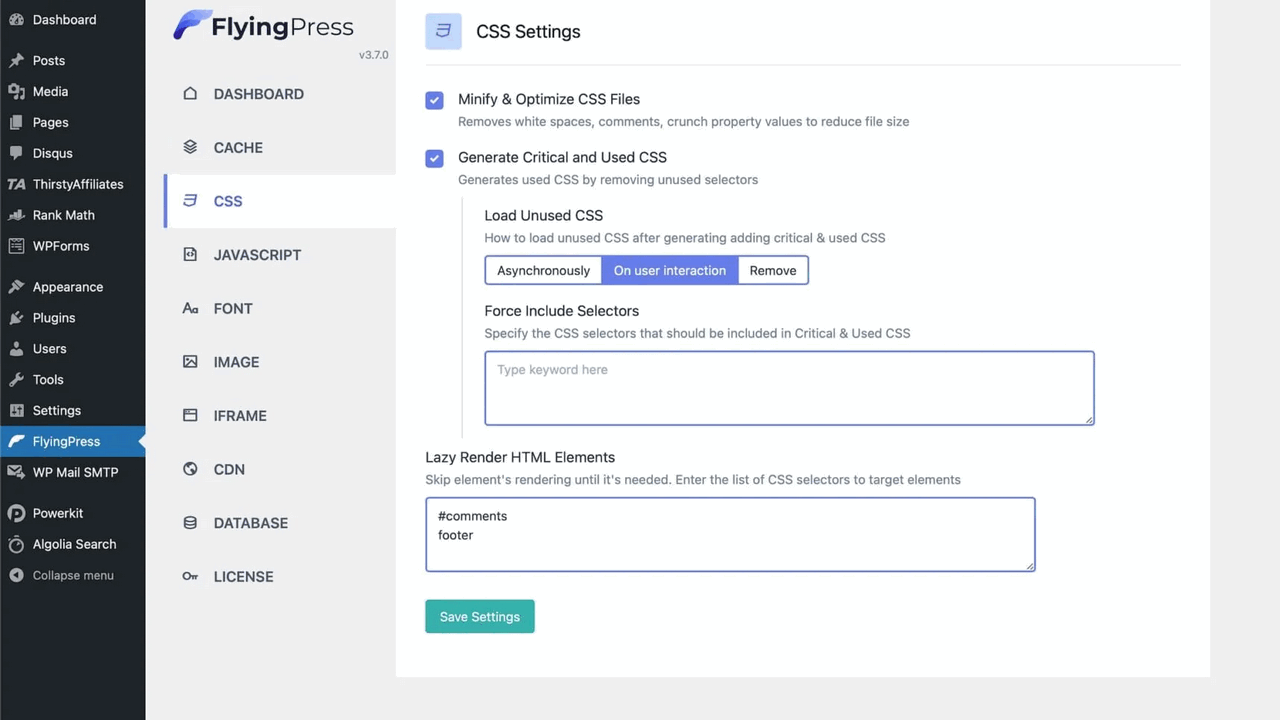
It starts with caching, but quickly FlyingPress wants to be much more than just a pure caching plugin for WordPress. Above all, FlyingPress is immediately and clearly aimed at beginners who don’t know too much about the technical background. The plugin guides you through all the steps slowly and allows you to activate the functions little by little, so you can see the effects directly. FlyingPress does not make any compromises in its functionality.
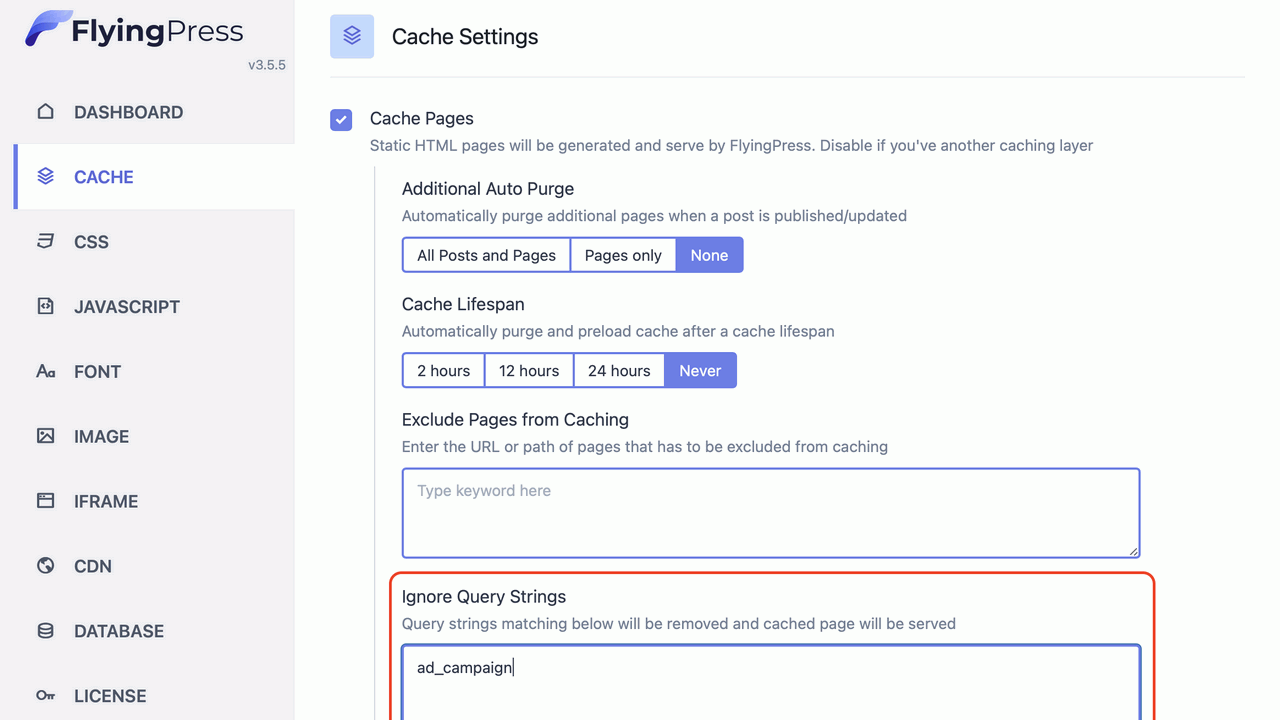
From the page cache to the clever cache preload, the minimization of code or the removal of unused styles, everything is included. As an addon there is the FlyingCDN, which not only takes care of the best possible accessibility of the assets, but also takes care of the image optimization and converts images directly to WebP if desired. A wonderful all-in-one solution that sees itself as just that and advertises that no further plugins are needed here for performance optimization. So FlyingPress literally takes care of making your WordPress installation fly by.
Advantages
- Everything in just one plugin, no need for other extensions anymore
- Clear and modern, so that the setup is easy from the hand
- Takes care of all areas that affect the performance of WordPress
- Connects cheaply and conveniently with the FlyingCDN CDN
Disadvantages
- Some functions have been outsourced to the paid addon FlyingCDN
4. Comet Cache
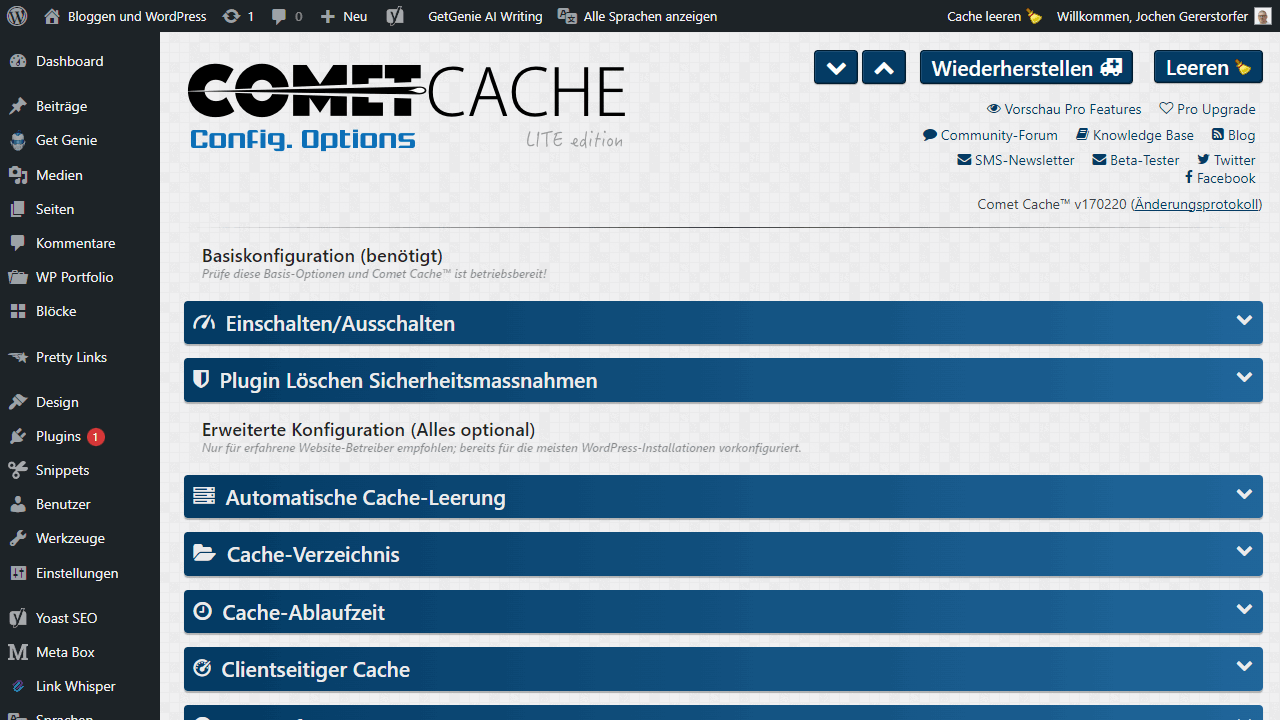
Comet Cache has been around for a very long time, and it was a little different from the other caching plugins for WordPress right from the start. Especially, the rather technical focus made Comet Cache interesting from the beginning. Namely, the plugin brings more than just the standards and is one of the few caching plugins to also think about caching logged-in users. Especially for complex websites, Comet Cache is very intriguing and offers many settings that I miss elsewhere, once I had Comet Cache in use. I’m sure you’ll feel the same way. But don’t worry, Comet Cache also offers a quick and easy default setup if you’re not familiar with it. In addition, every function is documented and explained in detail so that you can work out a lot on your own, should you ever want more.
The basis is a strong cache engine for WordPress, which knows exceptions for URIs and user agents. Also, feeds and error pages can end up in the cache. So especially for sites with membership plugins Comet Cache can be very effective, as it wants to cleverly include logged-in users in the caching. Interesting for large websites is also that it has many hooks and interfaces where developers can start and then program individual solutions.
Advantages
- One-time payment without subscription or further costs
- Very sophisticated cache engine, ideal for complex sites
- Extremely good documentation that explains all functions in detail
- Logged-in user caching to ensure fast loading times here as well
- Dynamic cache and developer-friendly interfaces in the cache engine code
Disadvantages
- Sometimes too extensive for small blogs and websites
- Good documentation, but still not easy to understand
5. WP Super Cache
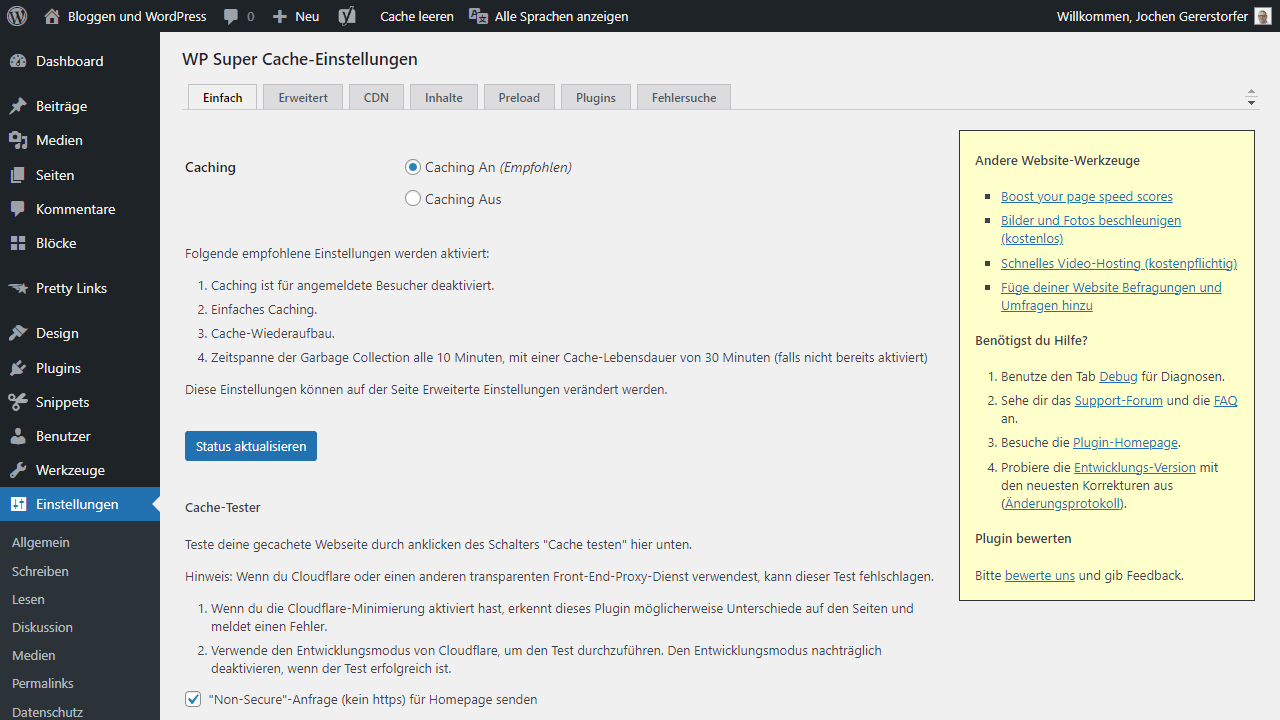
WP Super Cache is free and worth a look for that reason alone. In terms of settings, the caching plugin is simple. If you like, you can find more options for customization under Advanced and a CDN can also be integrated, as well as the extremely useful Cache Preload. Still, to me WP Super Cache doesn’t seem very well-thought-out and there are few unique ideas or settings that refine the caching. Instead, it’s simple and solid. Nothing more, nothing less.
WP Super Cache is one of those things. Although the plugin is now from Automattic, the developer behind WordPress itself, it has had recurring compatibility issues with themes and plugins, and has also been affected by security vulnerabilities a noticeable number of times. As someone who lived through the launch of the big caching plugins, I can say that WP Super Cache has never been very popular with me. Even though the plugin now works very solidly, it is still one of the less recommended caching plugins for WordPress for me. But in the end, that’s for everyone to decide for themselves.
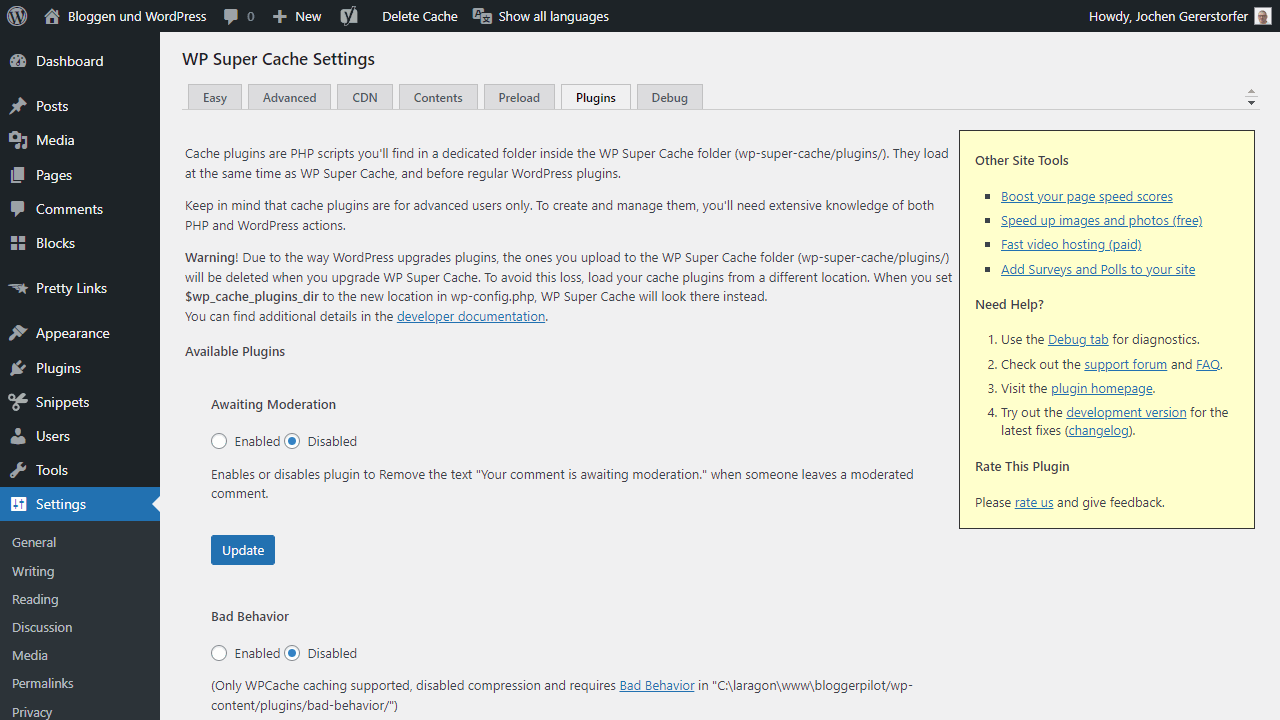
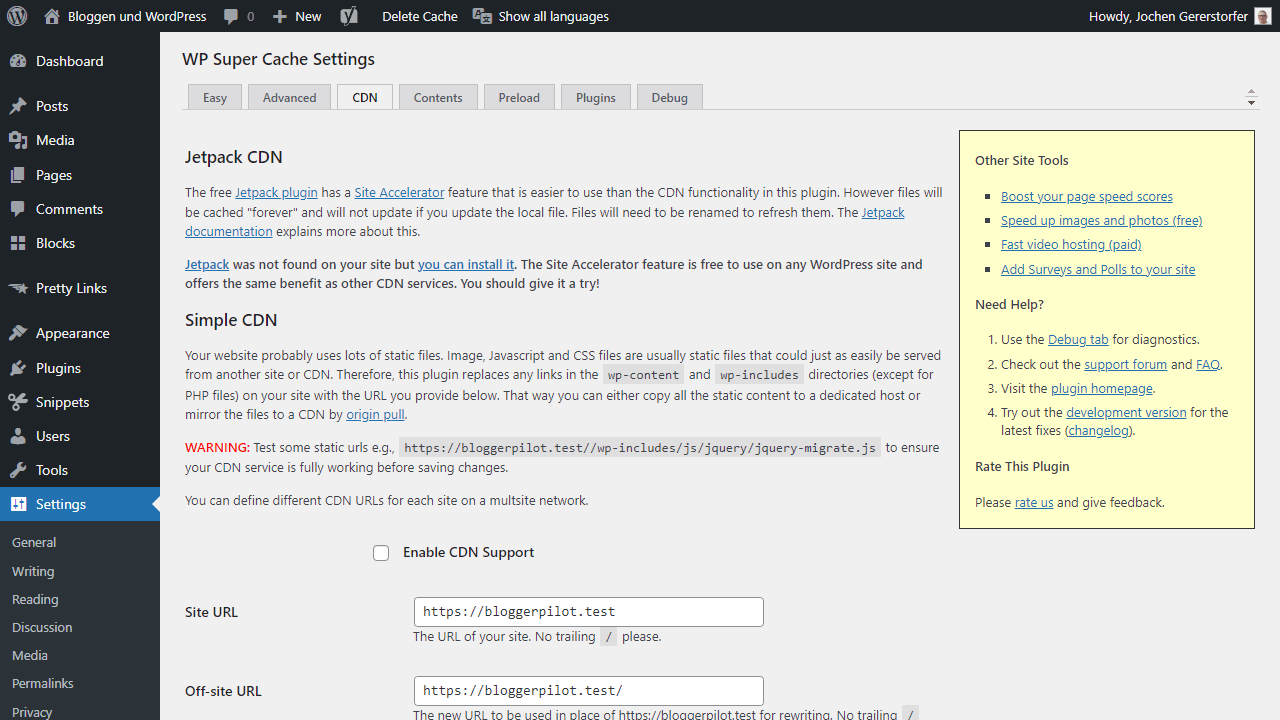
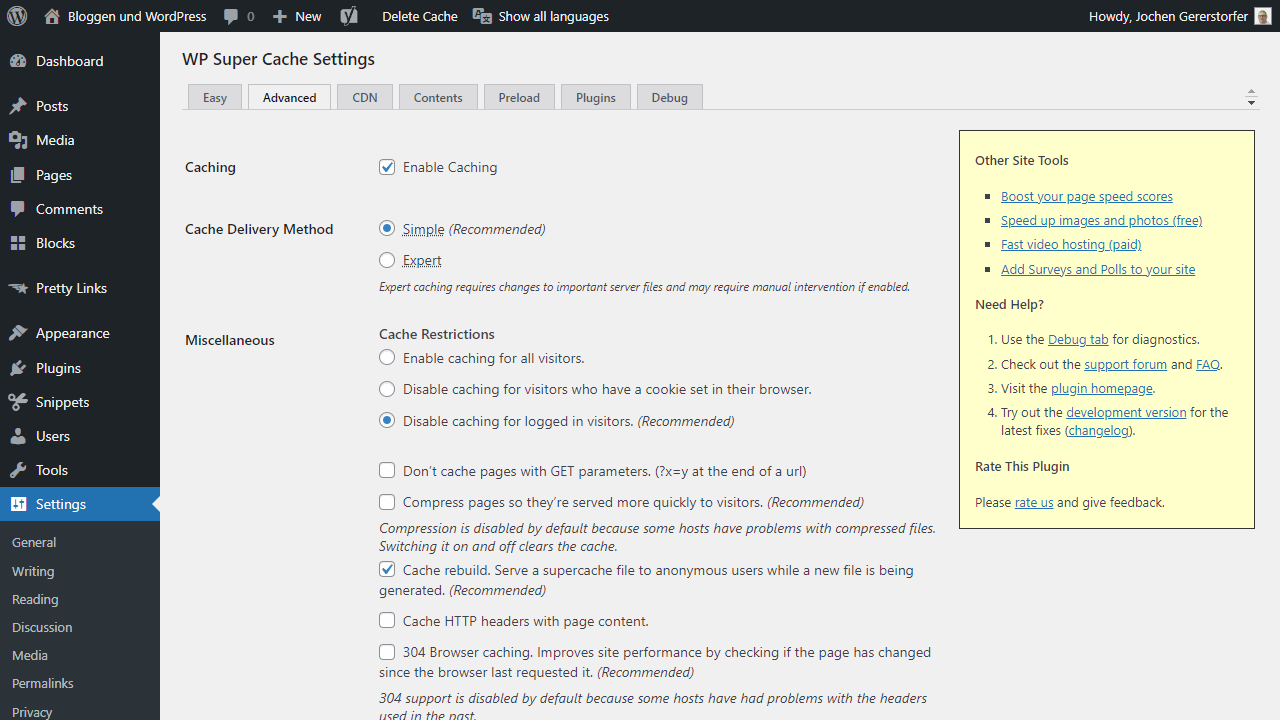
Advantages
- Basically, effortless to use
Disadvantages
- It lacks detailed settings and extras
- In the past, there were some problems with the plugin
6. Cache Enabler
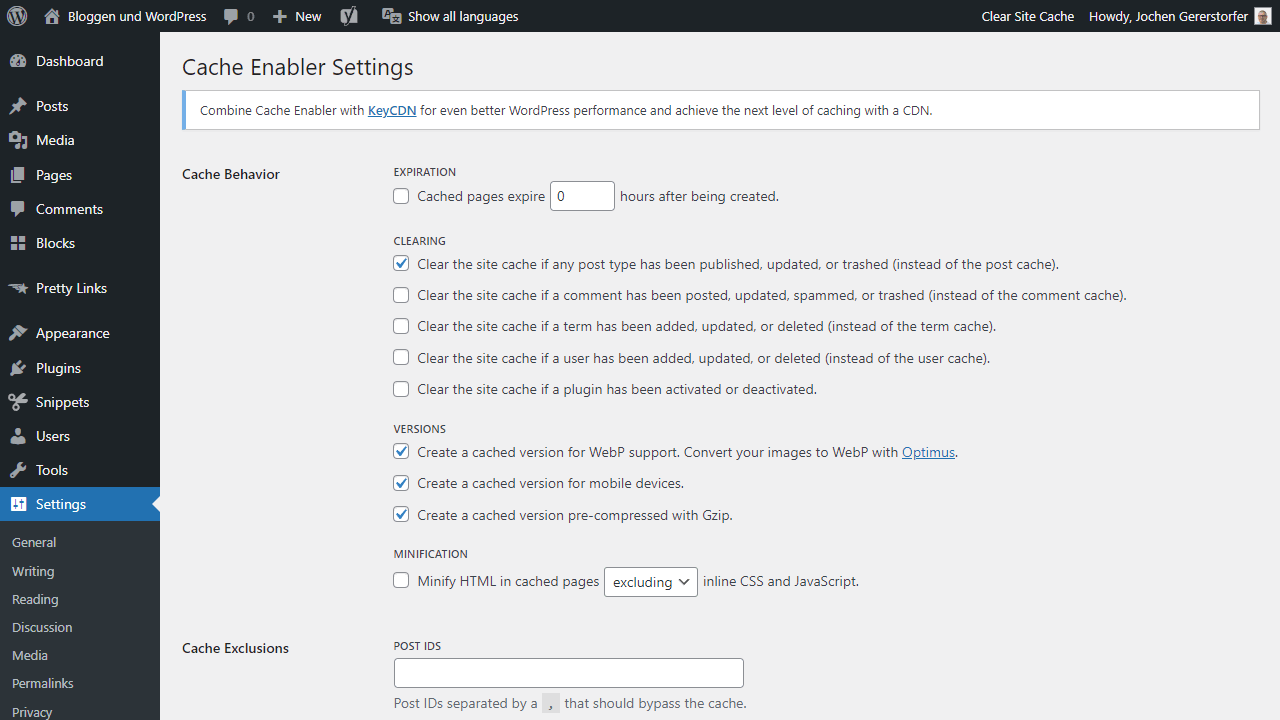
Cache Enabler builds on the well-known Cachify plugin, which formerly came from an active and, more importantly, talented WordPress developer. But while Cachify has not evolved in any meaningful way, KeyCDN’s Cache Enabler has become an all-purpose weapon when it comes to caching. Especially on rather small blogs or websites that don’t have great exceptions or extras like members areas, the plugin is ideal. Due to its small size, simple mechanisms and well thought-out caching features, it requires minimal resources while bringing the best possible performance.
Therefore, the Cache Enabler plugin cannot do so much and that is precisely its greatest strength. It automatically creates a cache of your blog after activation, intelligently cleans the cache when new content is created, minimizes the code including inline JS and inline CSS and works smoothly with plugins like Optimus or Autoptimize. Cache Enabler is just the right plugin if your site is comparatively simple and you’re looking for the simplest and most efficient solution possible. There are no extras here, but it doesn’t waste any server resources either.
Advantages
- Extremely minimal and very performant
- Ideal for small sites and blogs
- Clean connection with Optimus or KeyCDN
Disadvantages
- No extras, only pure caching
7. Hyper Cache
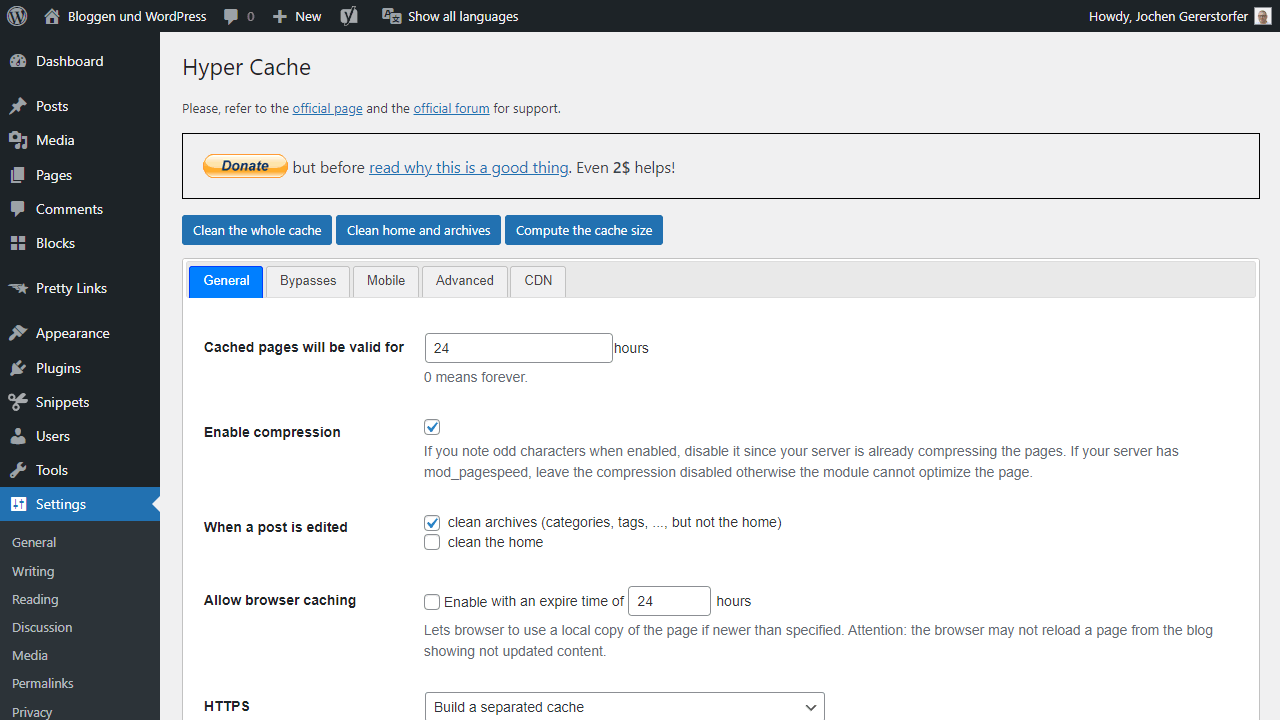
Hyper Cache has been around for a very long time and is maintained and expanded. Hyper Cache is and remains one of the plugins that also appear rather reduced because they are deliberately intended to work best possible even on weak hosts. This primarily means that you should not expect any great extras or additional features here. At the same time, one or the other exception has been thought of, so that commenting users can also have a cache displayed, for example.
Furthermore, the folder in which the cache is created may be generated outside of your blog. This is quite handy if your backup plugin tends to include it unnecessarily in the backup. So Hyper Cache does have a few small extensions and options in the end. Just don’t expect too much. This is all about providing the fastest and most efficient cache possible for WordPress. That’s basically all there is to it.
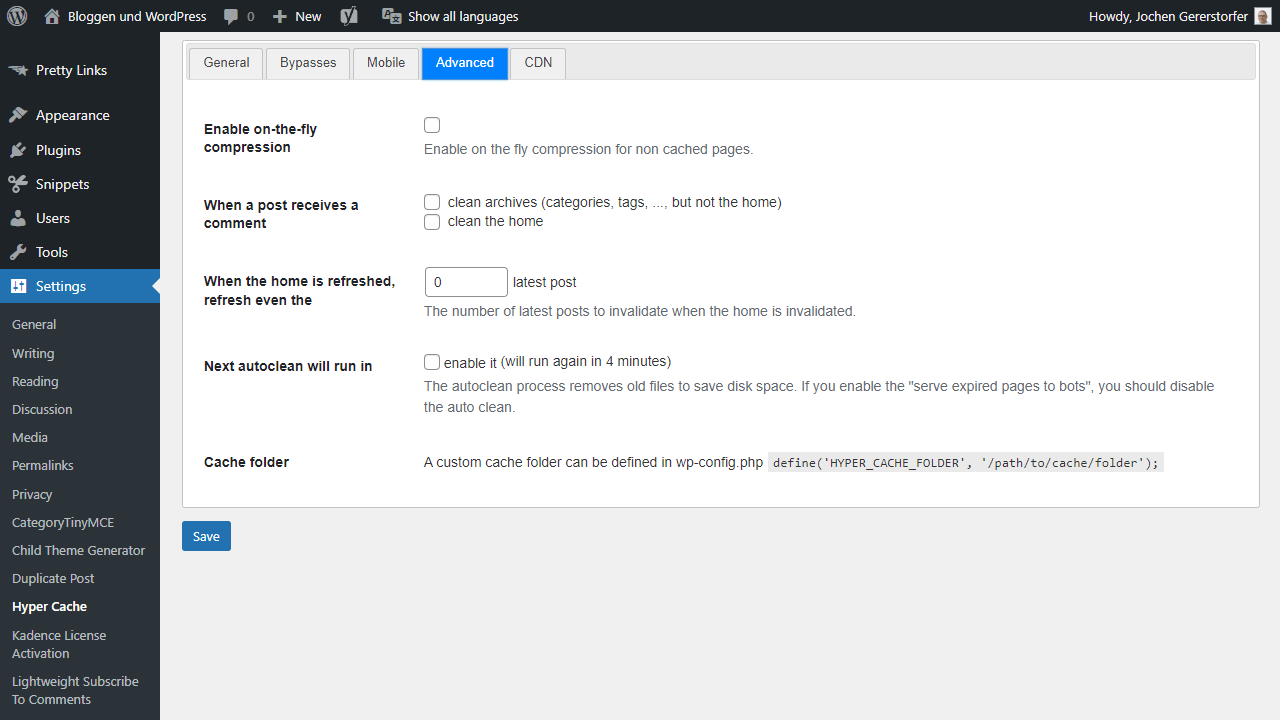
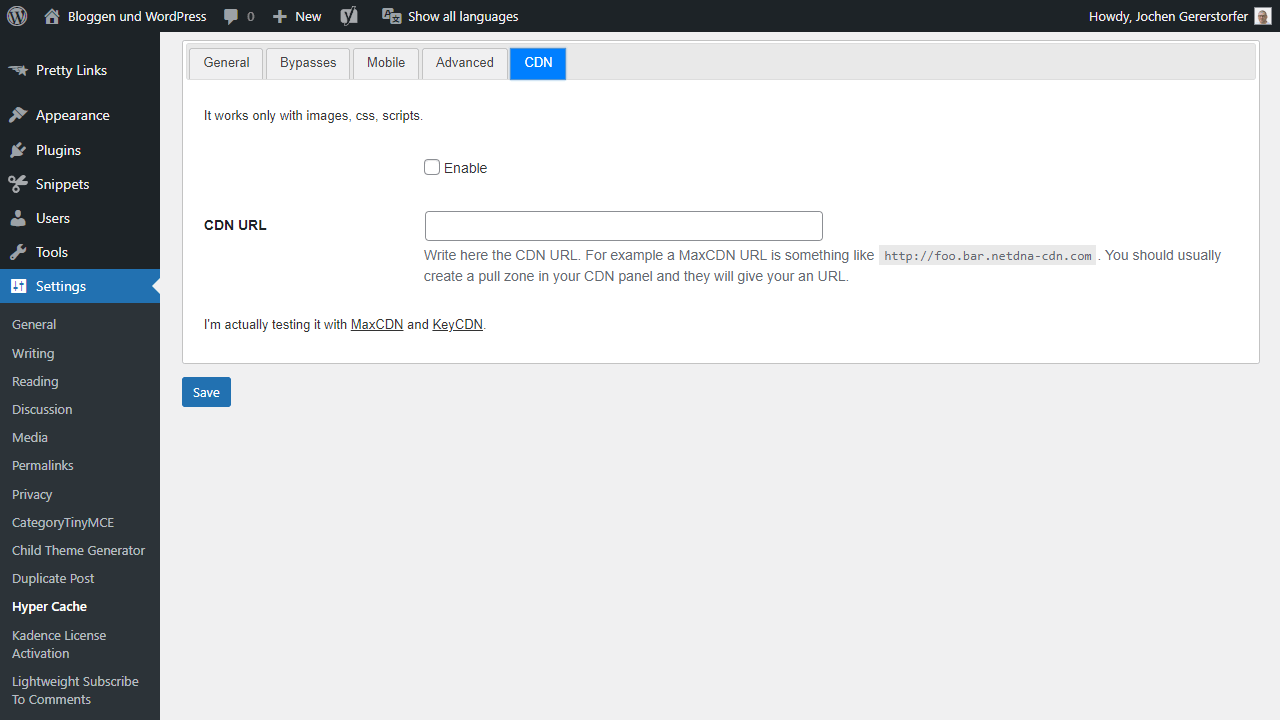
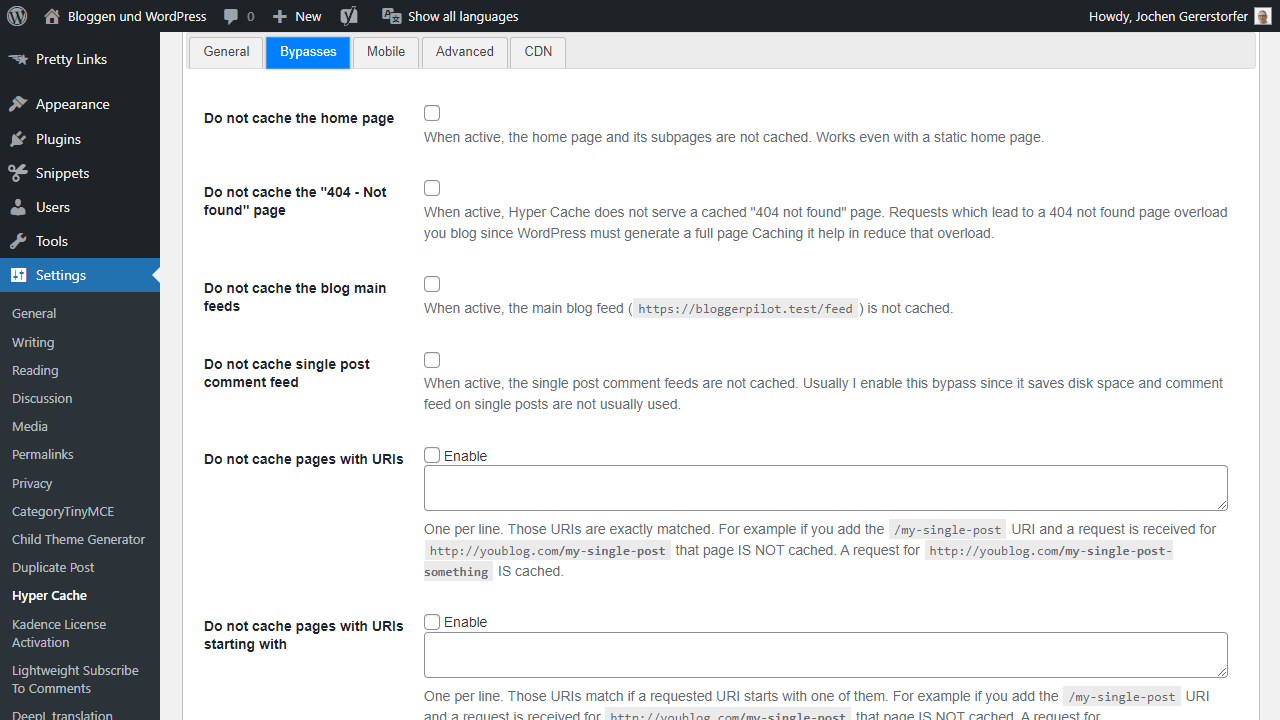
Advantages
- Very fast and very effective
- Few, but useful options
- Cache folder can be created outside the blog
Disadvantages
- None known
8. WP Fastest Cache
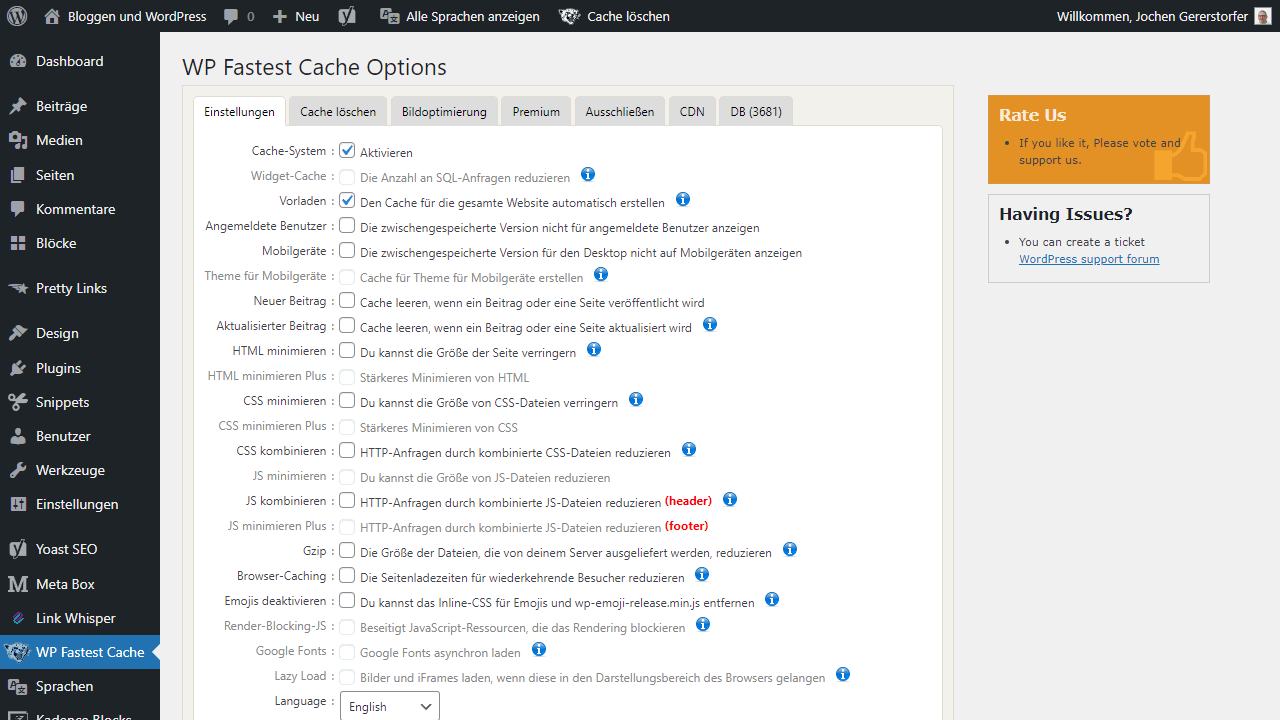
In the free version of WP Fastest Cache, you get a well-functioning, effective page cache that supports all important features and runs performantly. In the premium version, on the other hand, there are further customizations for the best possible performance and, most importantly, advanced caching methods. In the paid variant, the code is minimized accordingly, JS and CSS files are automatically combined and if you wish, you can even activate a separate mobile cache or the widget cache. Image optimization or a delay in the loading of JavaScript is then also included.
In the options, you will also find many options with which you can activate or deactivate individual parameters. The menu seems a bit technical, not to say outdated, but that shouldn’t scare you off. The cache itself works great with WP Fastest Cache and is really very fast and resource efficient. With all the other excellent caching plugins for WordPress, does it have a right to exist? Most definitely, because in the end it always depends a bit on which plugin you get along with the best. So maybe WP Fastest Cache is just the plugin you’ve been looking for.
Advantages
- Almost all functions are individually selectable via hooks in the menu
- Moible Cache and Widget Cache included as useful extras
- Free version is already sufficient for most blogs
Disadvantages
- Menus look a bit technical and outdated
- There are sometimes too many settings
9. Borlabs Cache
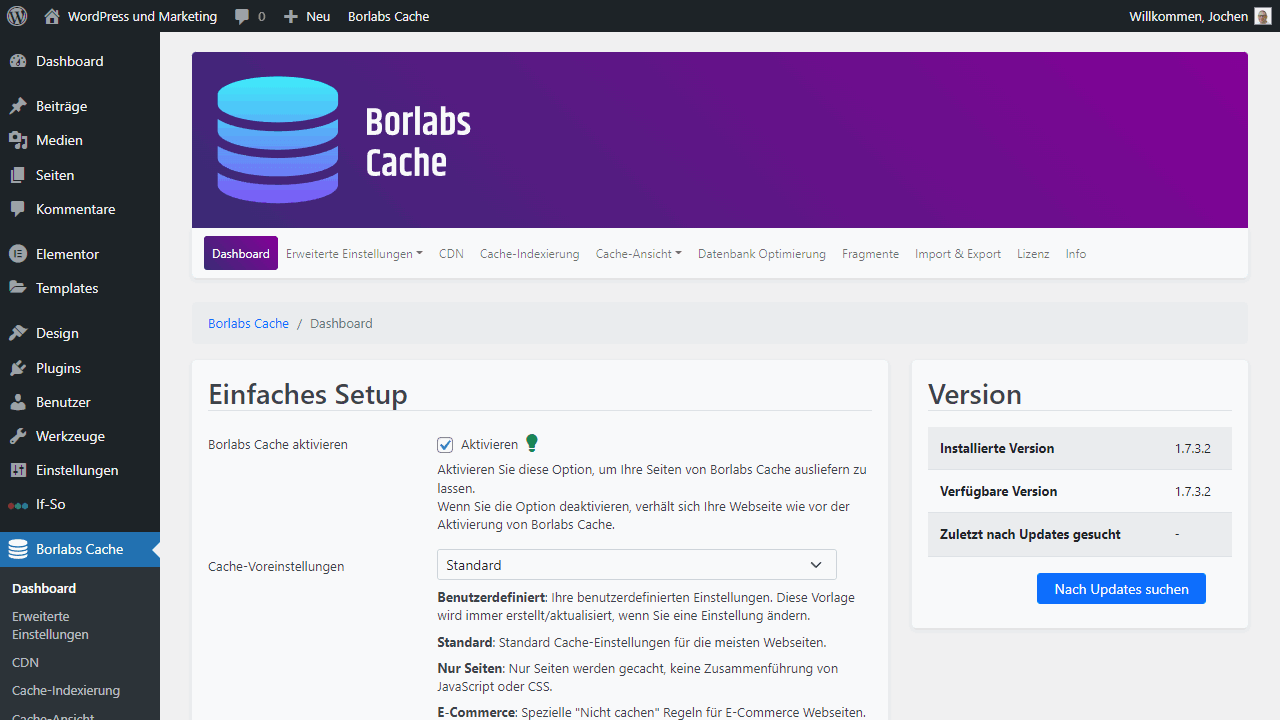
The Borlabs Cache Plugin I know only for a very short time. I don’t have the offspring active on any website, but I installed the free variant and did some tests.
The range of functions is excellent, but unfortunately only in the paid version. But that’s right because the developers have to live from something.
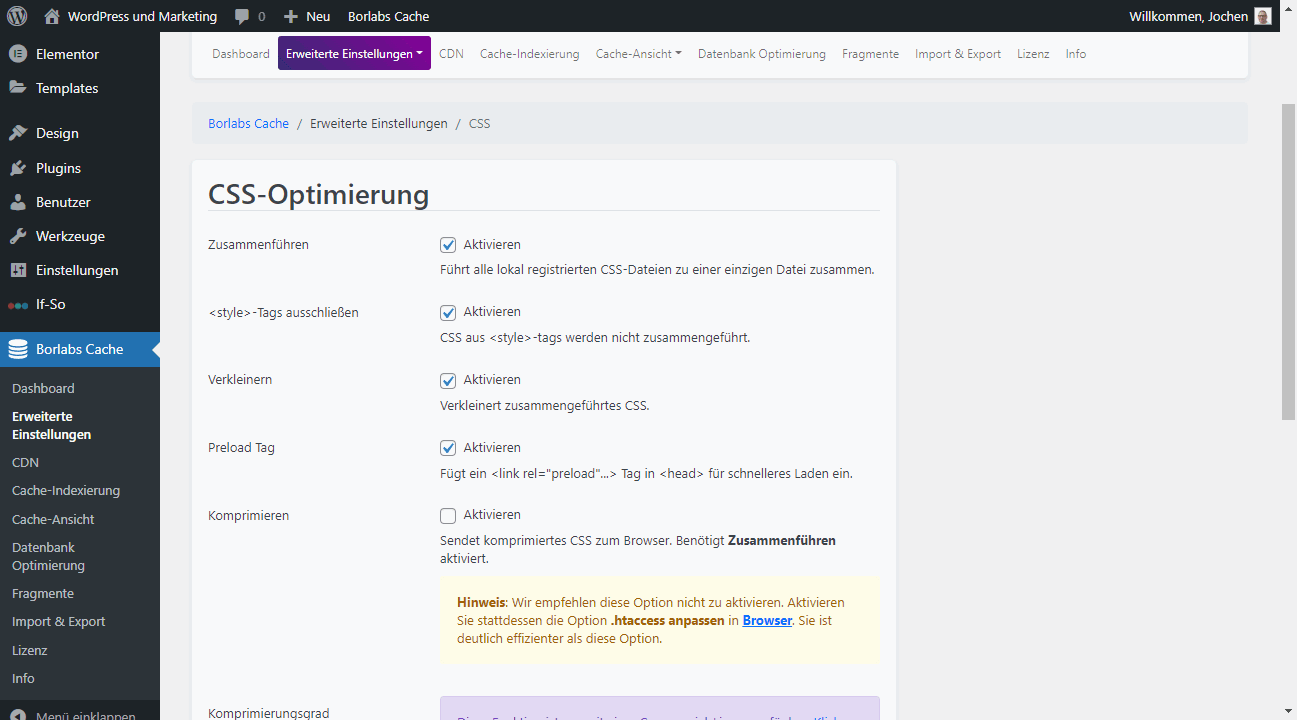
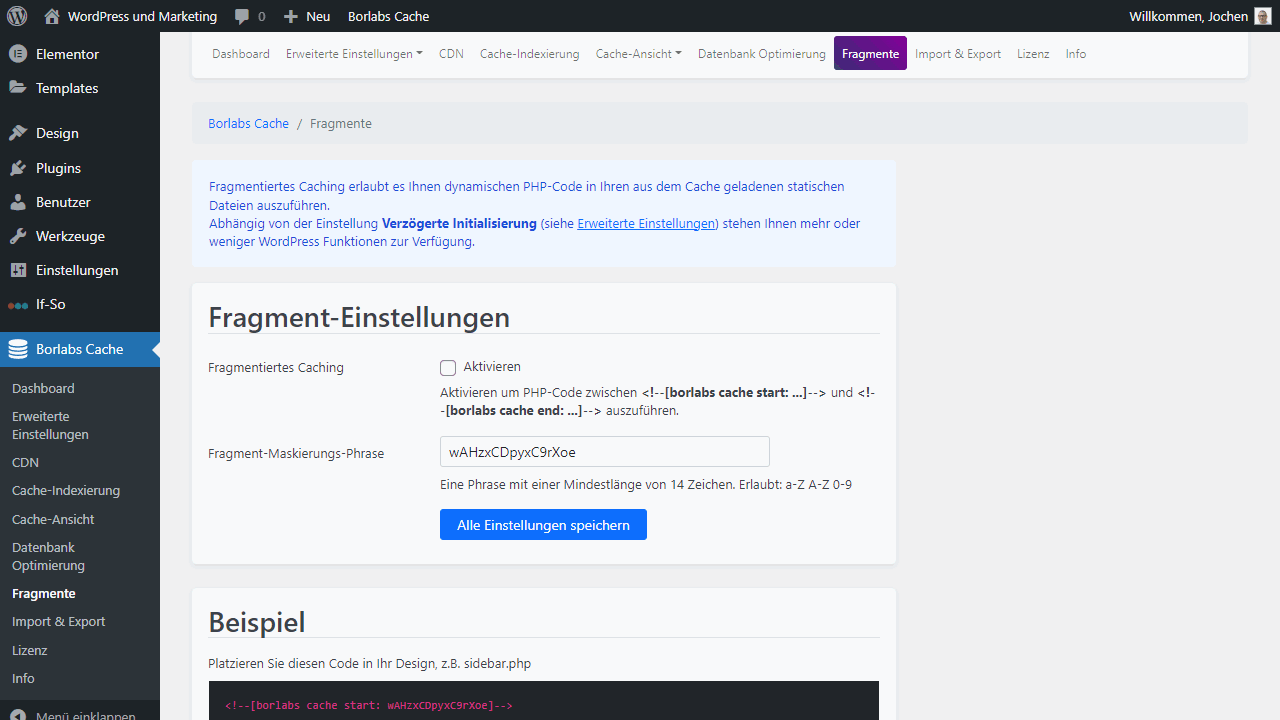
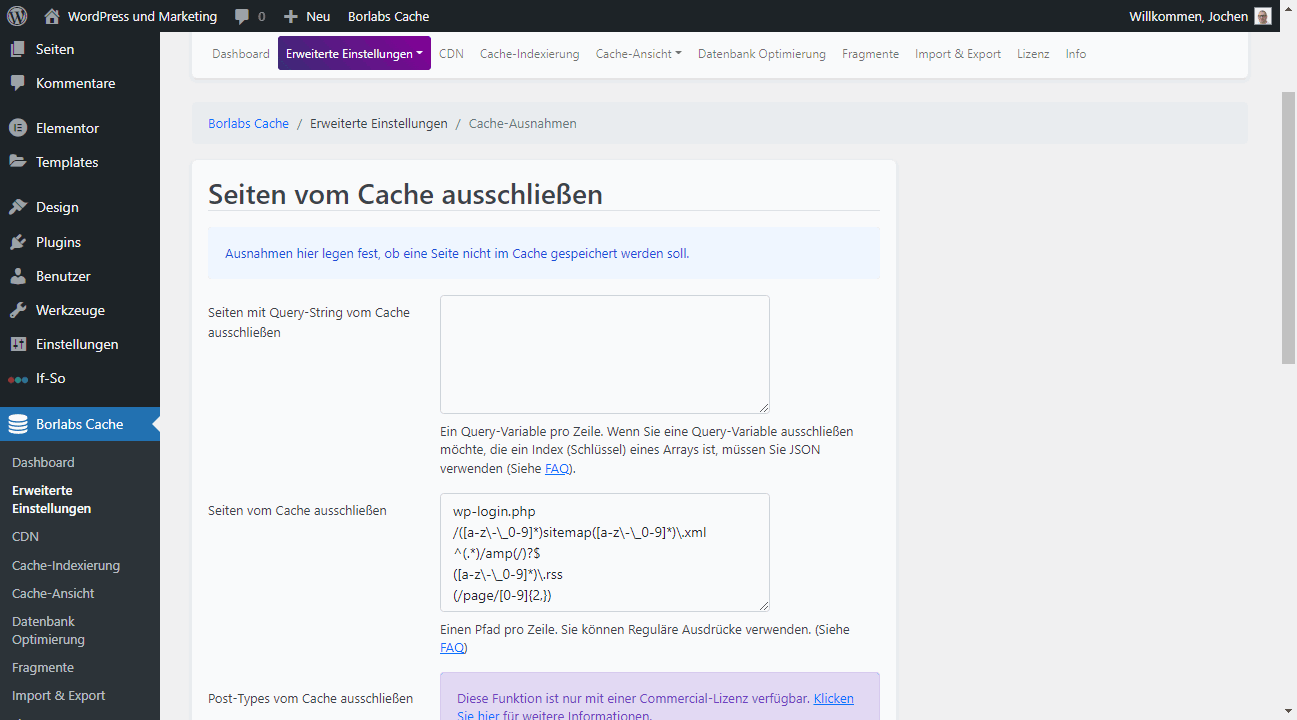
Advantages
- Caching solution from a well-known plugin developer
- Extensive functions
Disadvantages
- Free version too stripped down
10. Simple cache
The WordPress caching plugin Simple Cache immediately reminds me of Cache Enabler. Namely, unlike the many complex solutions, it wants to be especially simple. The caching plugin is thus an alternative that tries to be as simple as possible. Therefore, there is only an on / off button and that was basically all.
The WordPress plugin does not offer you much more. It also doesn’t try to be more than it is. It wants to provide the alternative caching method for those who don’t want to bother with all the options and parameters. It’s for an audience that has no idea about settings or what the best option is in case XY. Simple Cache is enabled, creates a simple WordPress cache and that’s it. Simple, but good. I such solutions, as they work much better for small sites than overloaded extensions.
Attention: during a retest the plugin could not be activated anymore. Also, the last update was over a year ago.
Therefore, the plugin is not a recommendation!
Advantages
- As simple as possible
- Can be used completely without prior knowledge
Disadvantages
- Not suitable for complex sites
11. WP-Optimize
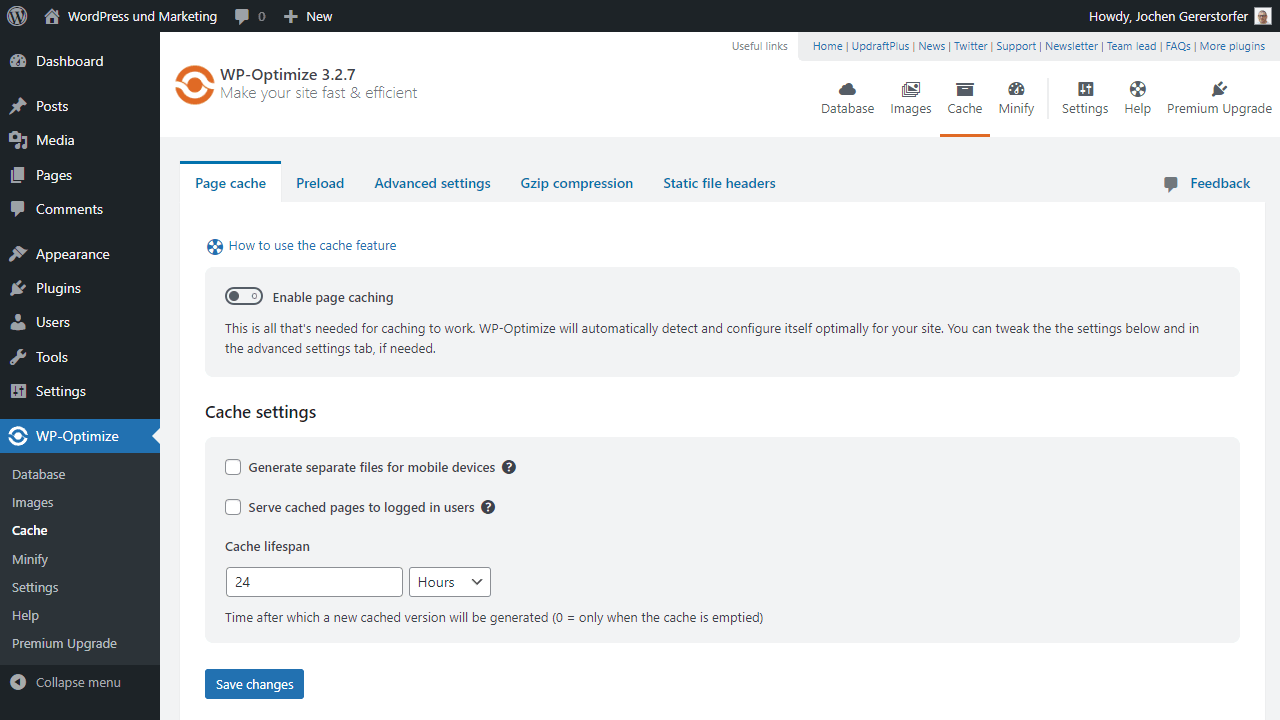
WP-Optimize is a kind of complete solution, and thus again the opposite to simple or exclusive caching plugins. Rather, WP-Optimize tries to optimize everything, whereby the caching itself is only a small part of the whole. It cleans and optimizes the MySQL database of WordPress, optimizes the images in your blog and integrates a cache engine for fast page loading. A complete package, although it does not go as far as, for example, the Swift Performance Plugin, which is also presented. It’s also not as simple or fancy as a WP Rocket.
But all that doesn’t have to mean anything if the functionality is given and the plugin works cleanly. When cleaning the database, WP-Optimize deletes the stuff in the recycle bin, old Transient API options and much more. It can also create a backup (via UpdraftPlus) to keep a backup copy. Nothing that other cleaning plugins can’t do as well, but here it’s built right in. It compresses images on upload and uses its cache to ensure that your WordPress website remains quickly retrievable and can withstand larger streams of visitors.
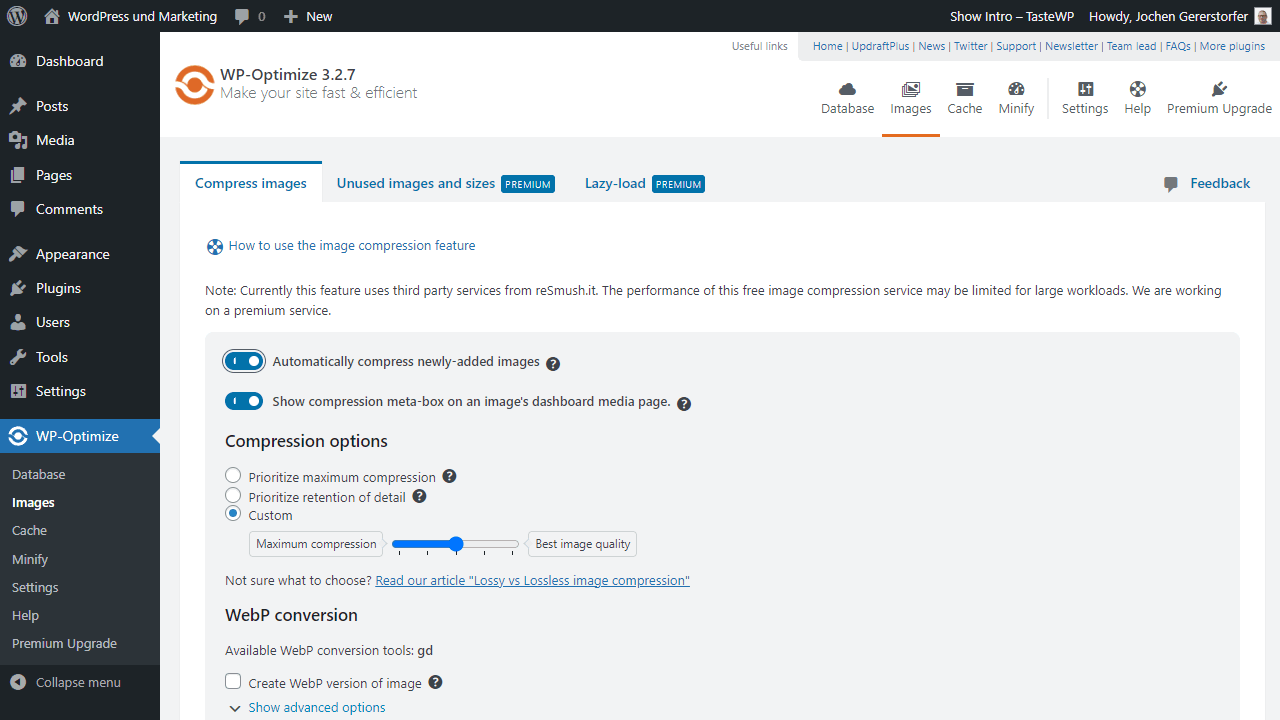
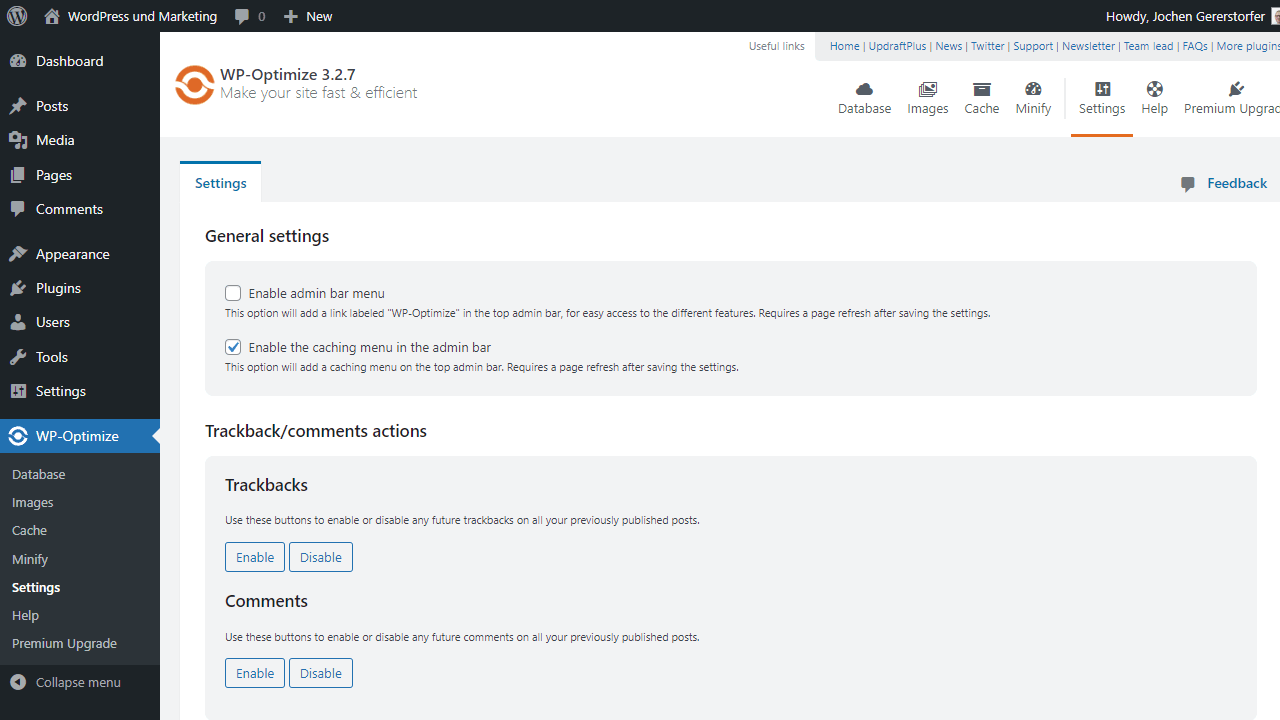
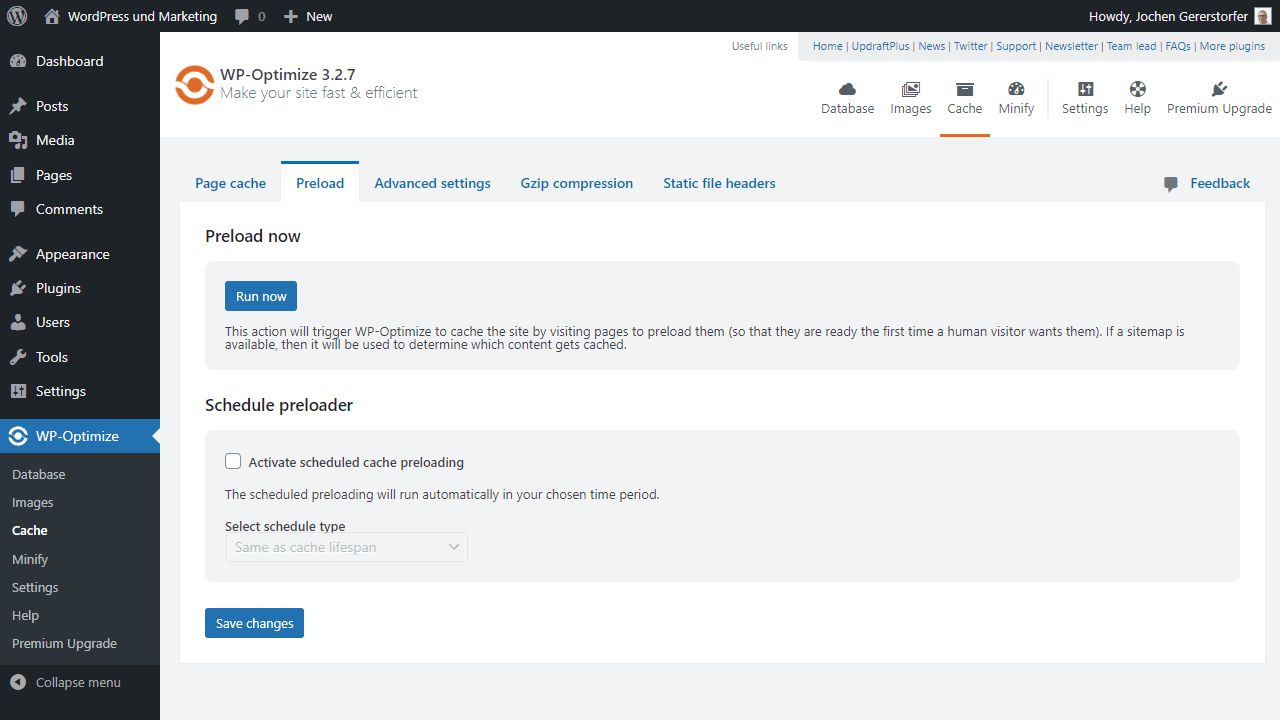
Advantages
- Free already very extensive
- Takes care not only of caching, but also of optimizing WordPress itself
- Compression of images is directly integrated
Disadvantages
- True functionality only in the paid version
- Not necessarily fancy or easy to use
12. LiteSpeed Cache
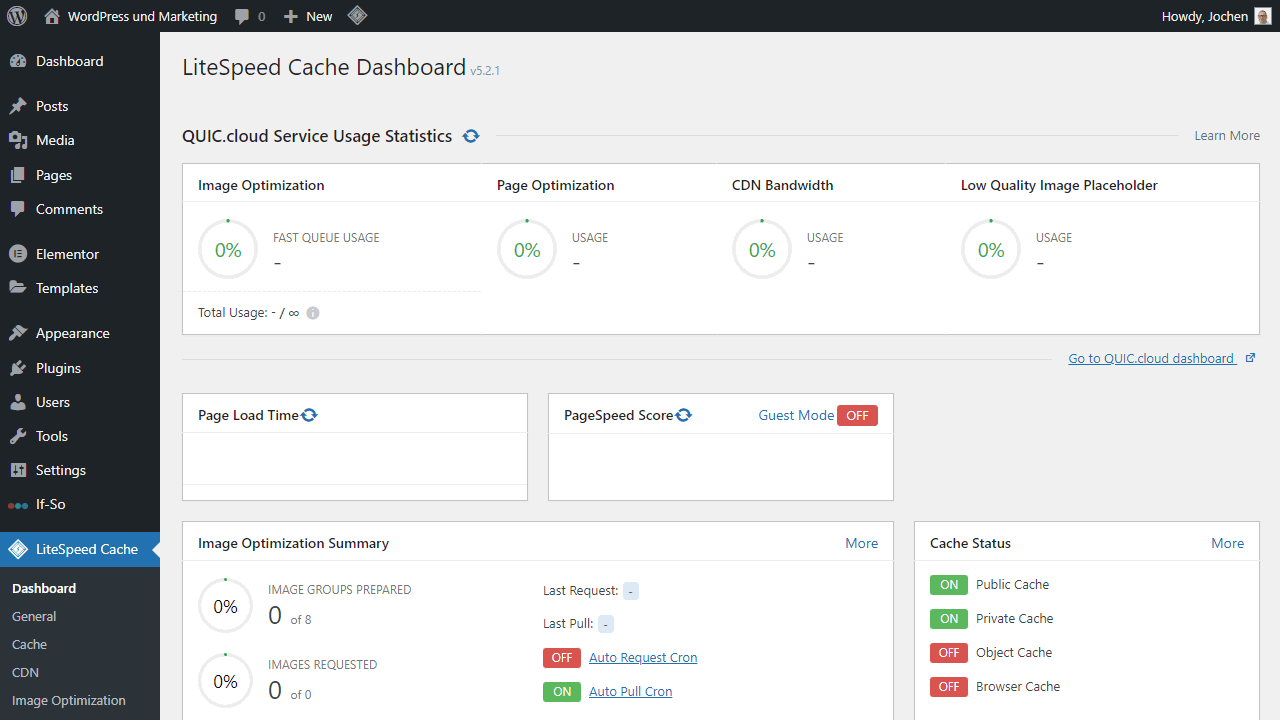
If you run WordPress on a LiteSpeed web server, you know all about the advantages over Apache. But if you have no idea what Apache or LiteSpeed are, this plugin will probably not help you either. It is based directly on LiteSpeed’s integrated LiteSpeed cache. This is significantly faster than almost all other methods and delivers extreme speeds with particularly high efficiency. The LiteSpeed Cache plugin also automates all parameters, so you only need a LiteSpeed server to activate the LiteSpeed Cache for WordPress.
Meanwhile, the LiteSpeed Cache plugin for WordPress has become an all-purpose weapon. Besides the fast cache, it also brings image optimization, minimization of files and much more. Also, the database can be optimized directly in the plugin. To go into all the options, would now go beyond the scope. If your blog runs with LiteSpeed, this plugin is exactly right for you and almost without alternative, if you ask me. More is simply not possible with LiteSpeed.
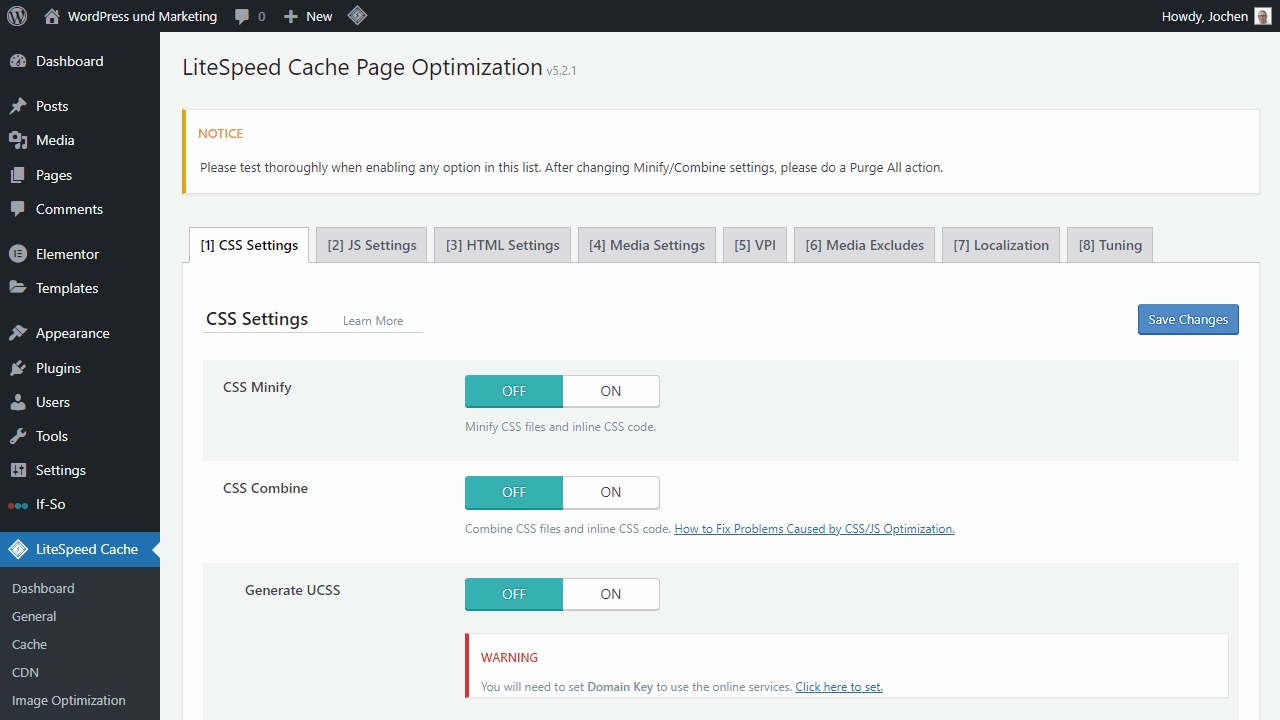
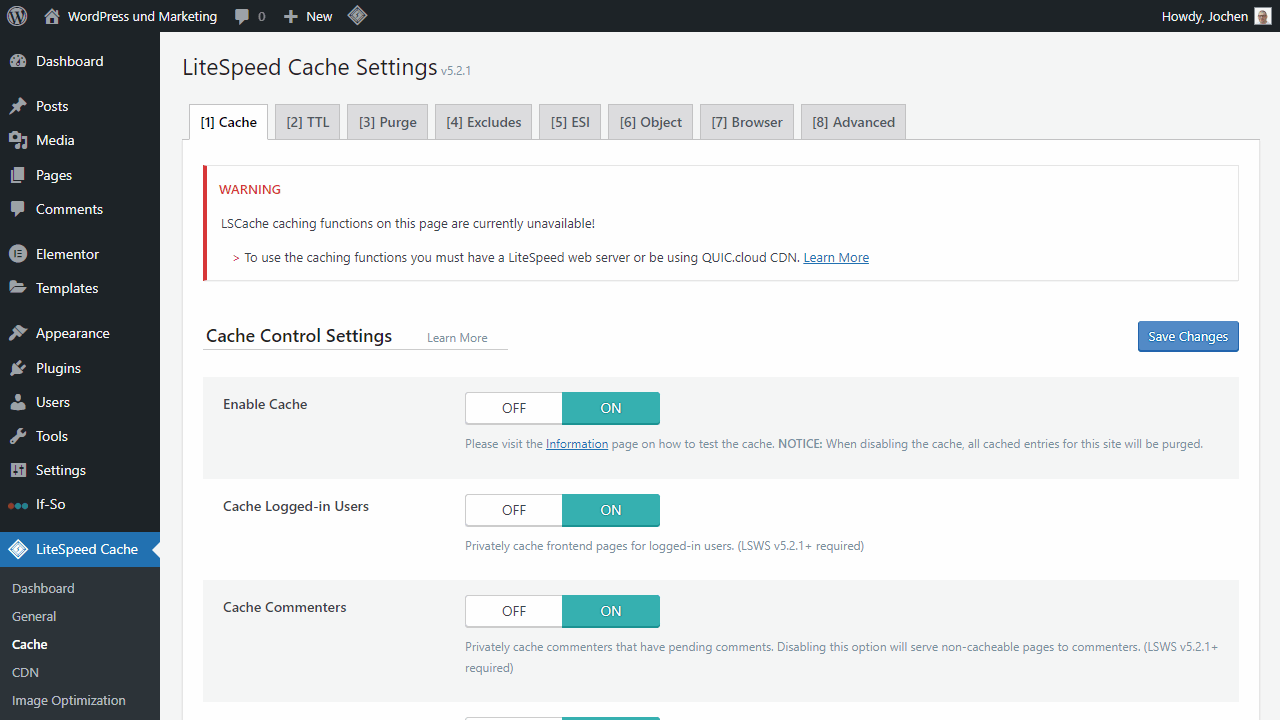
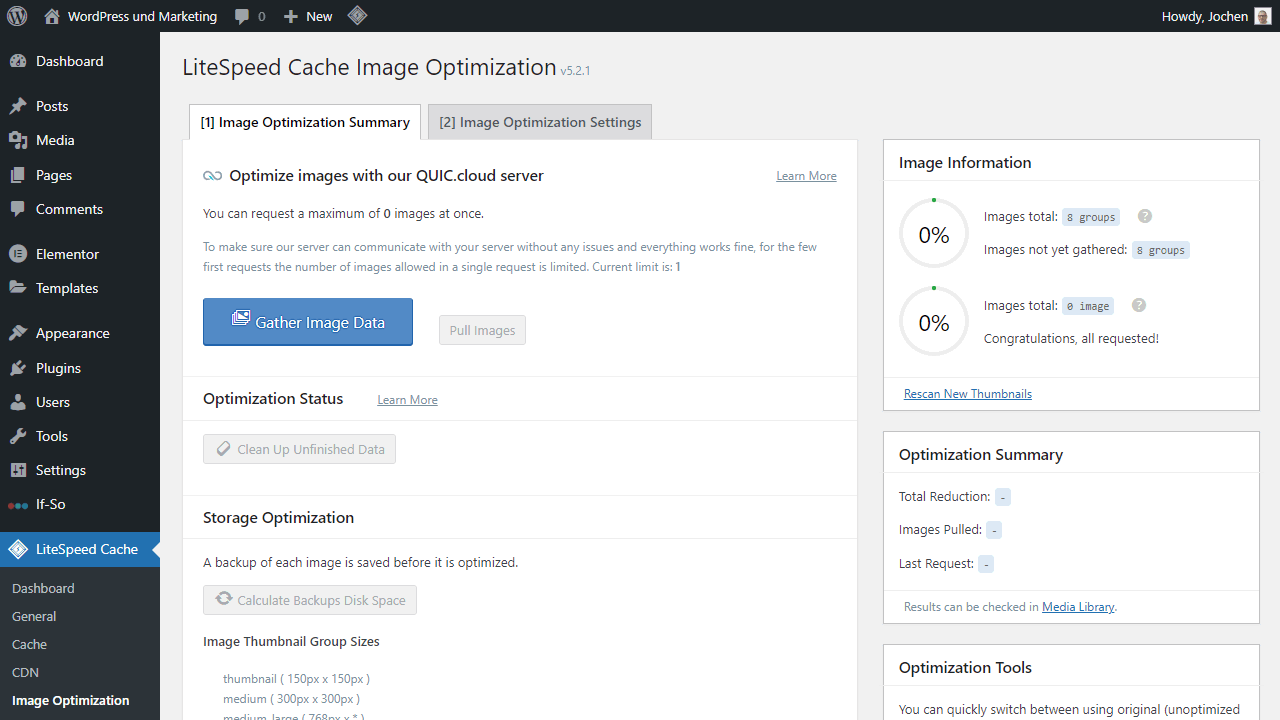
Advantages
- The best solution for LiteSpeed servers
- Very extensive optimization options
- Besides caching, WordPress optimization, minimization and cleaning is also integrated
Disadvantages
- Caching only for LiteSpeed Server
13. W3 Total Cache
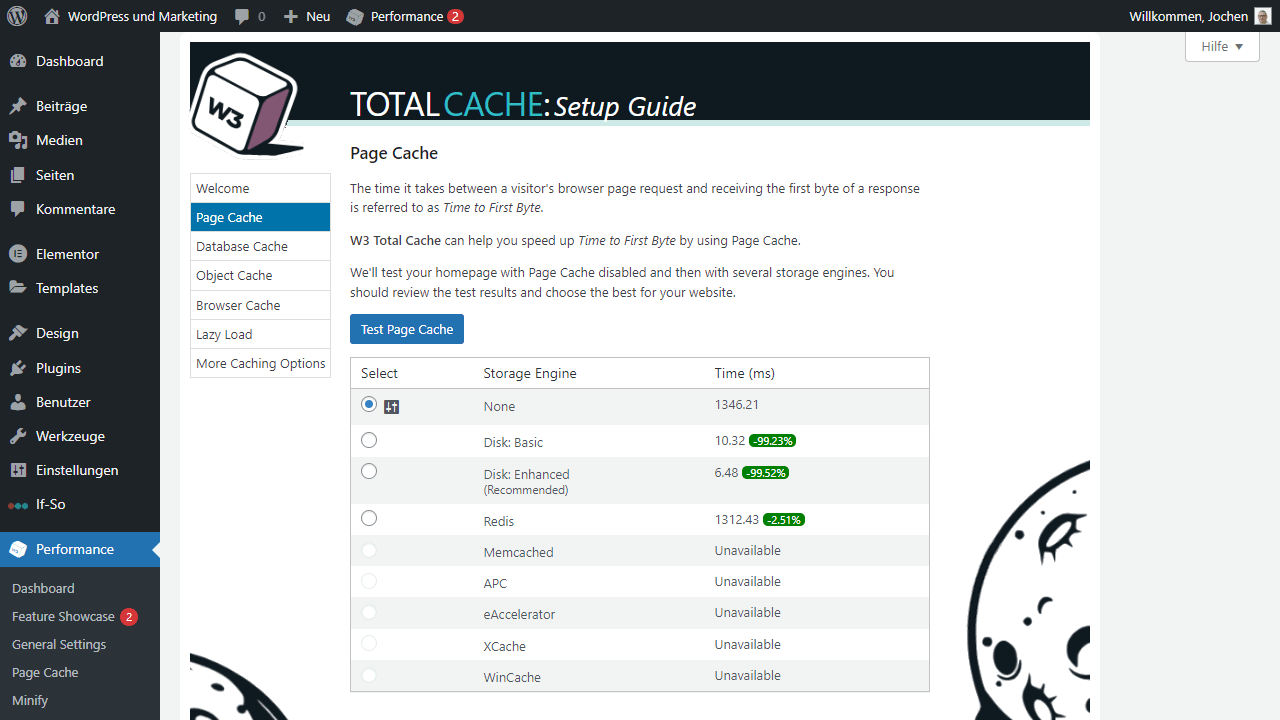
It is one of the first great and still incredibly comprehensive WordPress caching plugins. With W3 Total Cache, you get a true monster in terms of caching and optimization delivered. To put it briefly, W3 Total Cache simply has everything that could somehow play a role in caching or optimization. The whole thing is so powerful that it is ideal for particularly large websites or portals. Small blogs, on the other hand, have always been overwhelmed by W3 Total Cache because it is simply too complex for that.
W3 Total Cache works with almost all servers, can be connected to a CDN, integrates feeds and search results into the cache and additionally minimizes the assets if desired. The extension thus caches all aspects of WordPress, optimizes content and outputs a blazing fast website. But as mentioned before, W3 Total Cache is an ultimate solution for complex sites and nothing for simple blogs.
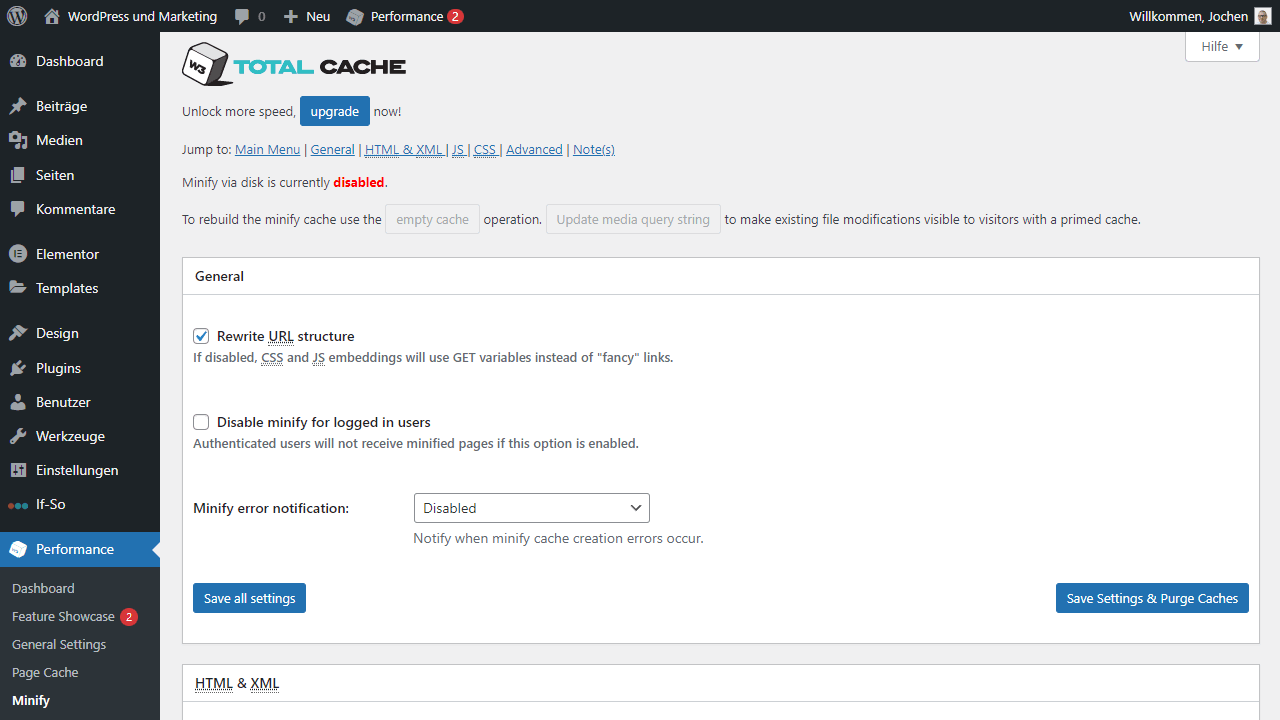
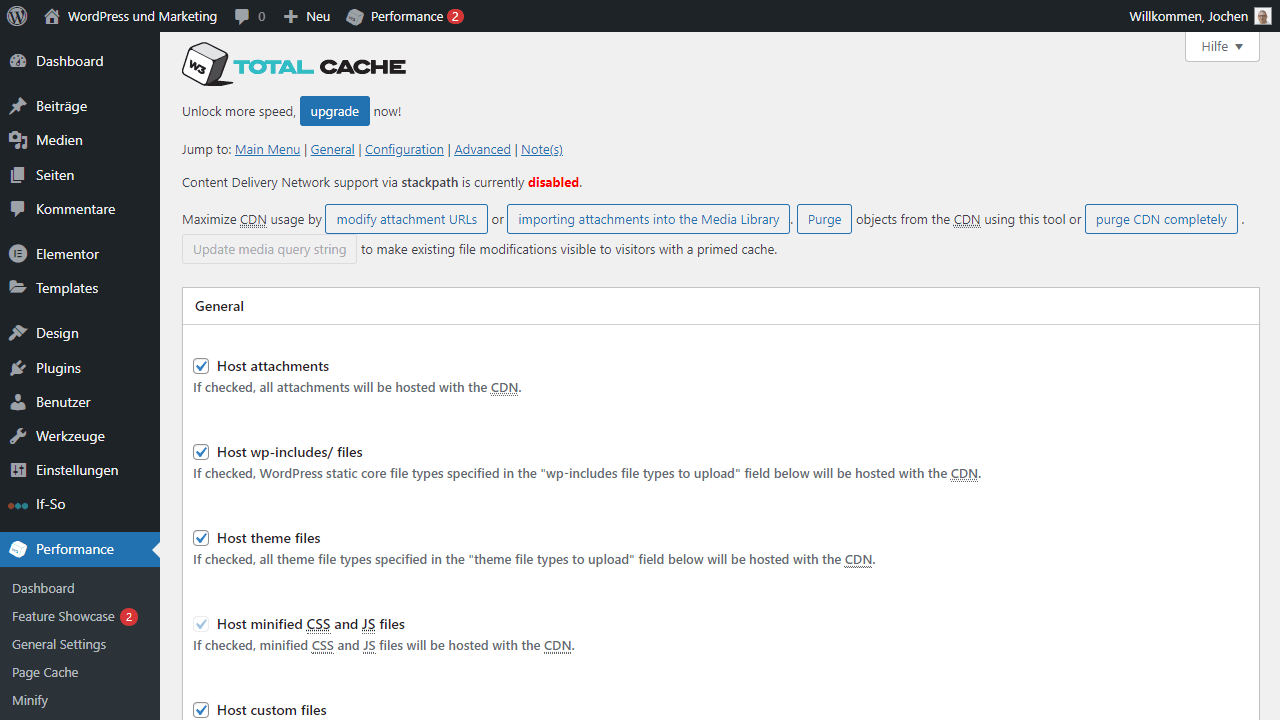
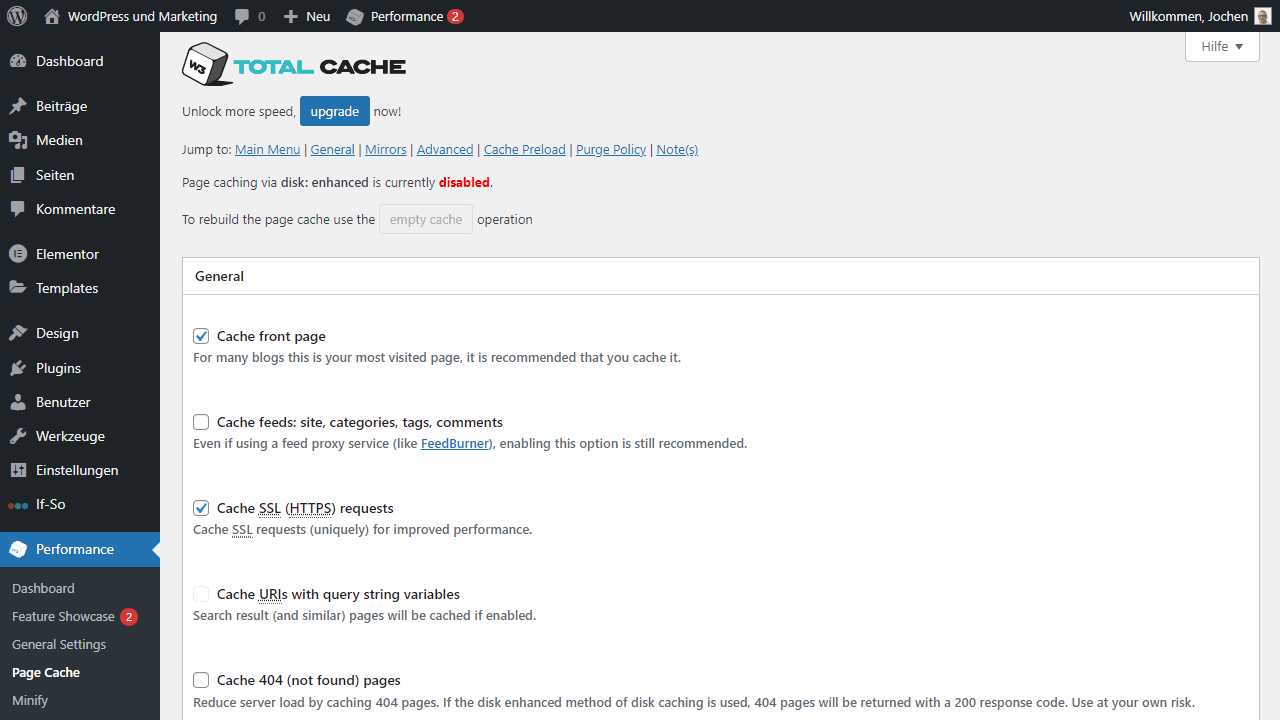
Advantages
- Almost all caching options in just one plugin
- Very extensively configurable and thus ideally suited for any application purpose
- Ideal for large portals, websites or particularly complex and extensive projects
- Free already a true monster of caching plugin
Disadvantages
- Fragment caching and extras only in the Pro version
What exactly is WordPress caching?
WordPress is a database driven and therefore a dynamic content management system = CMS. When you create a page or write an article, WordPress stores the content inside the database. Also your themes and plugins consist of many individual files that need to be retrieved depending on the situation.
This is how the WordPress cache works
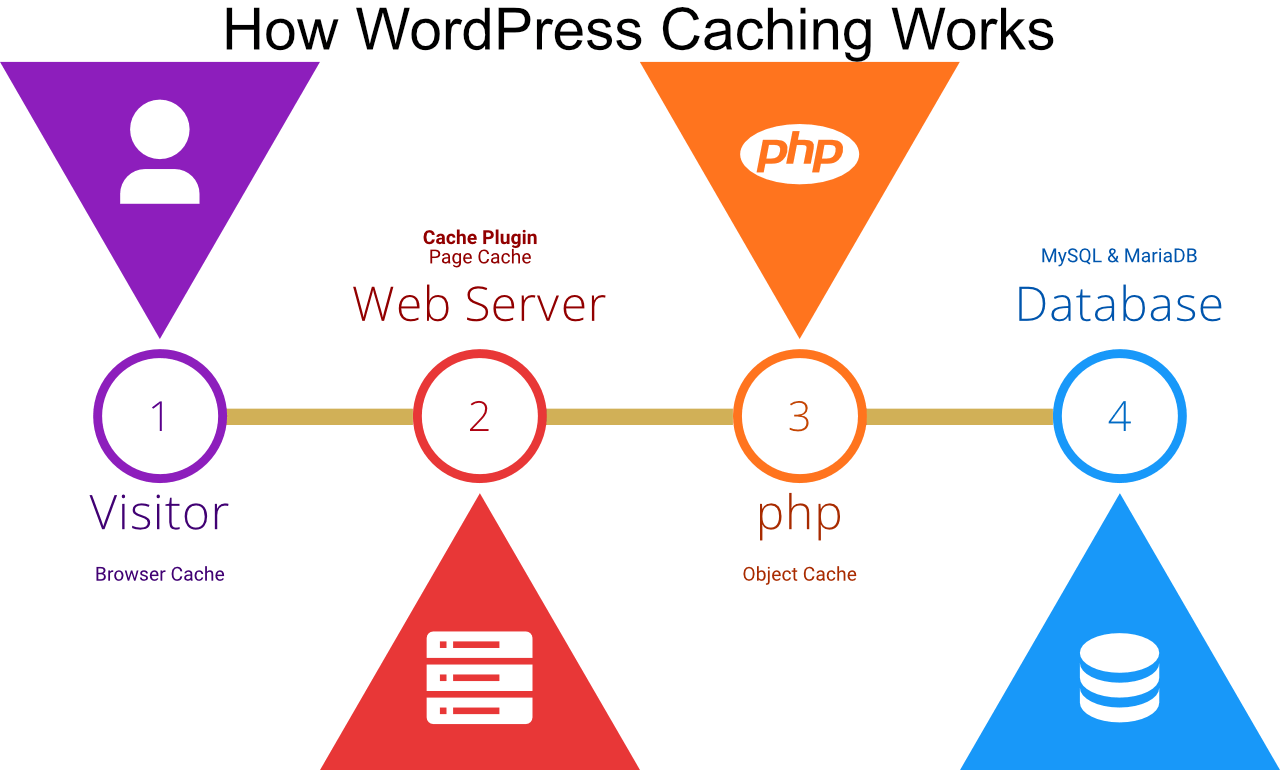
Basically, you have to imagine the page structure of WordPress like this:
- A user calls your website
- WordPress activates the WordPress Core and therefore PHP
- The CMS creates your blog from the theme files
- The plugins are queried and activated accordingly, depending on function and scope
- Then the actual content is retrieved from the MySQL database and is combined with all the other parameters
- Only now that the WordPress core has collected all the information, the CMS assembles the finished website from it and transmits it to the user who called it up
That’s quite a few steps before your website even appears. Also, many systems, files and aspects intertwine here, which WordPress must consider. This becomes problematic when suddenly a lot of visitors want to access your website. Quickly, the server becomes slow because it has to process an incredible number of requests at the same time. This is exactly why caching is so important.
The cache basically does what I just mentioned, but then saves the finished result, the actual website, as a static HTML file. If a visitor now calls up your blog, the above steps are completely omitted, and instead the saved HTML page that is already in the cache is immediately displayed. Often not even PHP is necessary anymore. This cache is ideally only renewed when the content on the respective website has changed.
This is exactly what caching plugins for WordPress take care of. They bring systems that effectively detect changes, renew only certain areas or split the cache particularly efficiently and move it to the server. This is exactly the procedure I’m going to take a look at with you now. If you want to get even more out of it, check out the best performance plugins.
Without caching it does not work with WordPress
Fact is in the end that it does not work without caching in WordPress. As a dynamic CMS, WordPress simply requires far too much power for page loading. What is not a big deal for a single visitor, becomes a problem whenever several want to access your website at once.
If your blog becomes slow over time, it’s often because more visitors keep coming, but you haven’t taken care of efficient caching yet. Thus, WordPress has to recreate the page for each user and cannot rely on a ready copy from the cache.
Caching therefore reduces the effort of page creation and thus minimizes the load that WordPress causes on the server. The more efficient and clever caching takes place, the faster your website can therefore be displayed. The WordPress caching plugins will help you to optimize everything in the best possible way.
Further on, you might be interested in these 9 free performance plugins.
Disclaimer: The reviews presented here have been prepared to the best of our knowledge and belief. The content reflects the subjective opinion of the author. For the preparation of this review, either an existing account (monthly subscription, private) or a free version was used. Statements about loading times always refer to Google PageSpeed Insights and GTmetrix.
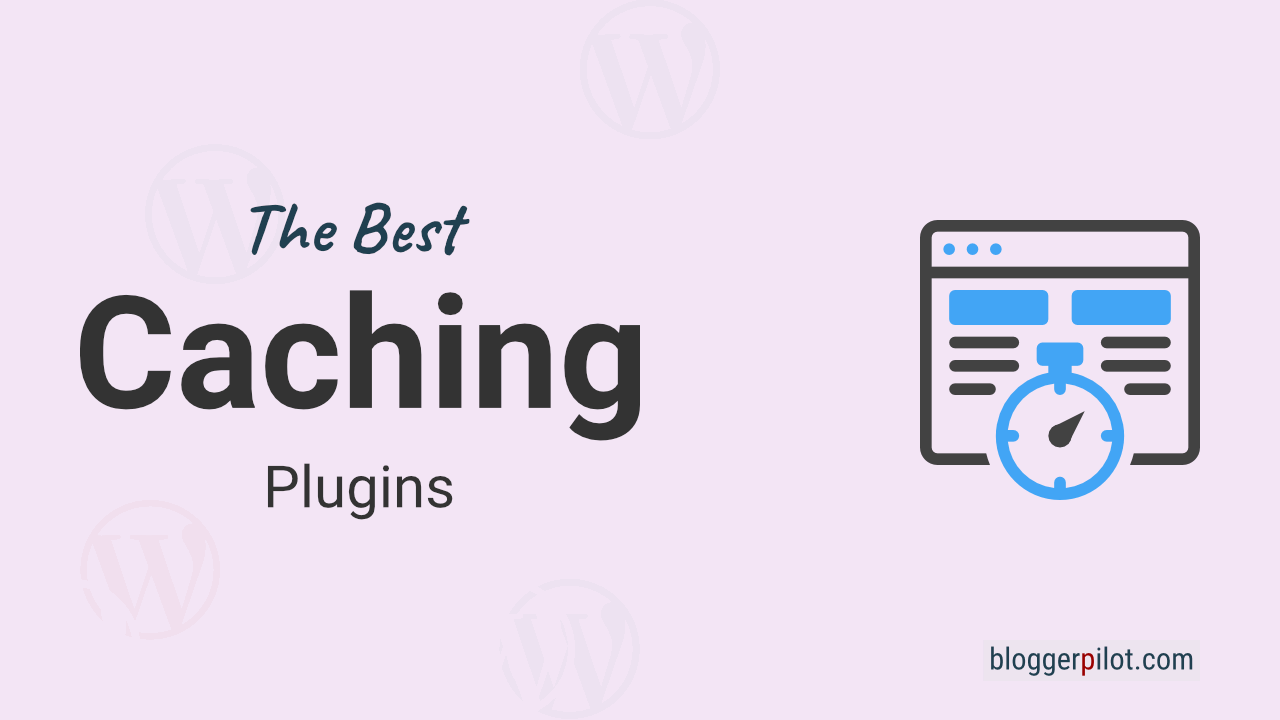
Which CDN would you suggest for beginners to start with Cache?
Hey Raj!
I use mostly the free Cloudflare CDN. A good paid alternative is Bunny CDN.
Jochen